#achaean omens
Text
Good Omens: Lockdown, Aziraphale’s SAD-ASS desk, and how they get to 'Our bookshop' in S2
Welcome to part 2 of me reading reeaally far into the Good Omens: Lockdown video! (part 1 from Crowley's POV here) This post assumes the item choices in the Lockdown visuals are intentional. What follows is going to be my headcanon regardless, but if you're into the Word of God, Lockdown is canon 'If you want it to be.' and I want it to be, sooo checkmate! >;D
Also this is something of a long boi (~13 minute read without following the links >.>), so if you're into unhinged analysis of details and literary references that indicate Aziraphale is in his longing era and want to learn more about author and fave-of-Gaiman, G.K. Chesterton, either get comfy or mark this to read later when you have time!

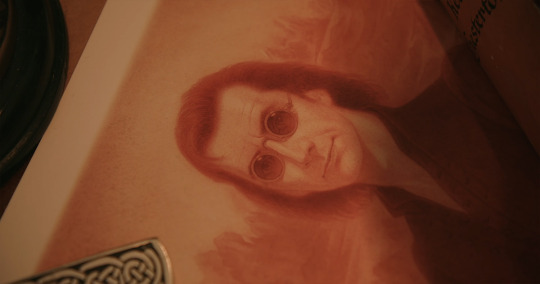

C: What?
A: *somehow surprised even though HE CALLED* A-ah, hello. It's me!
C: I know it's you, Aziraphale.
A: *regaining composure* Yes, well, just calling to see how you were doing in lockdown.
The video starts with shots of Aziraphale and Crowley's da Vinci sketches (and some sushi remnants)... Babygirl is flipping through the time-goes-too-fast-for-me version of a facebook album, thinking about his crush. vERY chill of him. (also the paper looks new and he's eating on top of them, suggesting these are prints and he has multiple copies of them... sooo normal)
If we look closer at the still of Crowley's portrait, we can see part of the spine of a book that reads Kei- Chesterto-. This is, of course, author Gilbert Keith Chesterton, to whom Neil and Terry (and Crowley) dedicated Good Omens:
The authors would like to join the demon Crowley in dedicating this book to the memory of
G. K. Chesterton
A man who knew what was going on.
In this post by @azfellandco about Chesterton, you can see a photo of the dedication page and also read the book excerpt where Crowley describes Chesterton as 'the only poet in the twentieth century to even come close to the Truth'.
C: I'm bored. I'm so very very bored - transcendentally bored. There's nothing to do here!
As Crowley is explaining his nap contingency plan, we get a shot of Aziraphale picking up his mug of hot chocolate, then the image below of the 2/3rds gone bottle of Courvoisier cognac (i mean maybe he is baking with it let's not jump to conclusions), and then the stack of books beside a framed woodcut print of witches dancing with devils...


...that I used reverse image search to trace back to page 17 of a book from 1720 called The history of witches and wizards: giving a true account of all their tryals in England, Scotland, Swedeland, France, and New England; with their confession and condemnation.
Interestingly, the text above and below the picture reads:
At their Meeting they have usually Wine, or good Beer, Cakes, Meat, or the like; they Eat and Drink really: When they meet in their Bodies, Dance also, and have Musick...
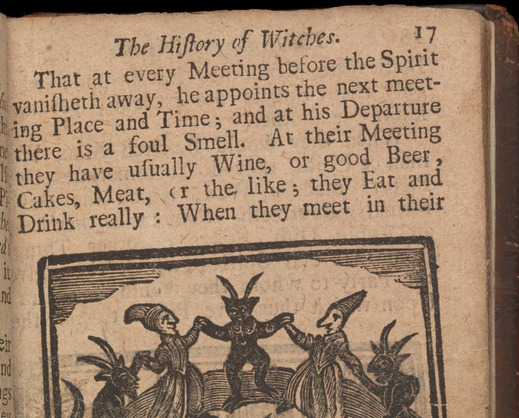
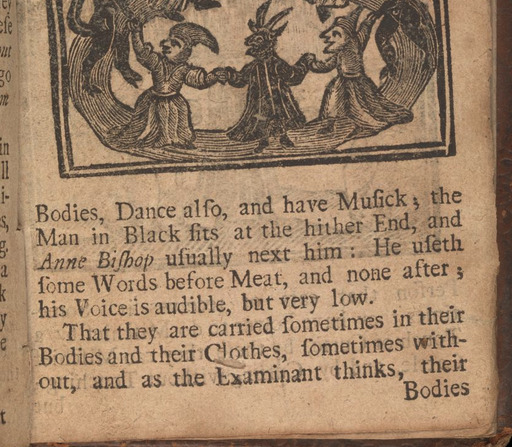
Beside the framed print of Aziraphale's idea of a really great night out is a stack of books that includes (going from top to bottom):
Homer's The Iliad, Book 2
Orthodoxy by G.K. Chesterton
Forbidden Rites: A Necromancer's Manual of the Fifteenth Century by Richard Kieckhefer
a book by Hilaire Belloc with no visible title
The Club of Queer Trades by G.K. Chesterton
The Iliad (according to sparknotes) has the following major themes:

....Interesting, ok. Book 2 in particular starts with a god (Zeus) messing with someone (Agamemnon) via a dream that says he will be successful in taking Troy if he launches a full assault, balls to the (city) wall. Agamemnon, who is supposed to be leading the Achaean army to conquer Troy, believes the dream but then in a weird twist decides to test his army and be like 'jk actually I'm giving up and going home' and then is mad when the soldiers are like 'sick, to the boats!' Then Odysseus, who sparknotes tells me is the most eloquent of the Achaeans, gives an impressive speech to inspire the troops and reminds them that they vowed 'that they would not abandon their struggle until the city fell.' ...No way that could worsen Aziraphale's internal conflict about being a bad Angel who thwarted the Great Plan. >.>; Orthodoxy we'll get to in a second.
Then there's Forbidden Rites which is a medieval necromancy guide translated from Latin with added commentary - Aziraphale is perhaps studying occult topics in an attempt to understand Crowley better? And then there's the Hilaire Belloc book on top of the second Chesterton book, a collection of related stories/episodes?, The Club of Queer Trades. The book's Wikipedia page says:
Each story in the collection is centered on a person who is making his living by some novel and extraordinary means. To gain admittance [to the Club of Queer Trades] one must have invented a unique means of earning a living and the subsequent trade being the main source of income.
Aziraphale and Crowley have rather novel/extraordinary jobs and they're both peculiar-queer and gay-queer. Neat. The narrator in the book is named Charlie "Cherub" Swinburne - also neat. >.> He goes on an adventure with his friend, a retired judge and president of the Club of Queer Trades, Basil Grant, (who Oct 2021 GoodReads reviewer Cecily said is "described as mad, mystical, and a poet, with almost no friends, but who “would talk to any one anywhere”) and Basil's younger brother, a private detective named Inspector Constable Rupert Grant. The last line of the book is:
Thus our epic ended where it had begun, like a true cycle.
(something something "It starts, as it will end, with a garden.")
Anyway, the Belloc book and The Club of Queer Trades are placed back to back in such a way that they almost look like they could be one book with two different aesthetics, or... two halves of a pantomime beast?! (stay with me I needed a segue)

Belloc and Chesterton have what is essentially a ship name:

It was coined by George Bernard Shaw (if you are like me and didn't know why you've heard of him: he wrote, among other things, Pygmalion, which was adapted into My Fair Lady). Shaw apparently liked to gossip about Belloc and Chesterton with H.G. Wells (again if you're uncultured like me: he wrote, among other science fiction-y things, The War of the Worlds).
In the Feb 15, 1908 issue of The New Age newspaper, Shaw said:

He continued:
"Chesterton and Belloc are so unlike that they get frightfully into one another’s way. ... They are unlike in everything except the specific literary genius and delight in play-acting that is common to them, and that threw them into one another’s arms.”
Shaw says Belloc is 'a bit of a rowdy', and 'cannot bear isolation'. Hmm. Then he says Chesterton is 'friendly, easy-going, unaffected,
gentle, magnanimous, and genuinely democratic'. HMM.
“They share one failing—almost the only specific trait they have in common except their literary talent. That failing is, I grieve to say, addiction to the pleasures of the table.”
Ok ok I think we can see where this is going.



(^ from Staged S3E6)
Now, someone did ask Neil Gaiman about this similarity, and he said the Lockdown video was filmed by Rob Wilkins in Terry Pratchett's library, and that he suspects 'Belloc is there because he was on Terry's shelves beside Chesterton.' And it MAY VERY WELL BE that NONE (0) of the book titles are meant in any way other than 'these are books from Sir Pratchett's library that looked nice on camera and ofc we wanted some Chesterton refs and maybe some demon-y stuff for Crowley' but that is WAY less fun so I am choosing to take them as intentional: these are books Aziraphale is actually reading (along with the sushi and many cakes he is actually eating). Let's put ourselves in Aziraphale's shoes and try to imagine how it would be to read this stuff during lockdown while you pine for a demon with slinky hips after you got in big trouble at work for Armageddoff (and work happens to have defined your worldview and general purpose in life).
C: welll... ngk then people might follow my bad example and get ill. Or even die—
As Crowley acknowledges that he ought to be out making peoples' lives worse, we see Orthodoxy by Chesterton open on the desk.
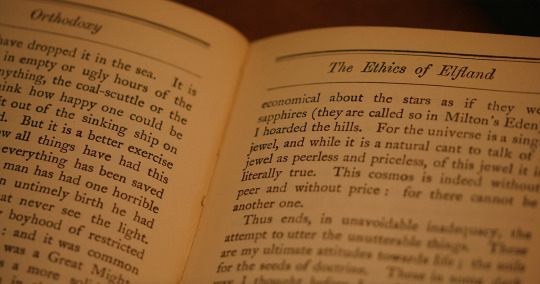
Orthodoxy is described as a ‘spiritual autobiography’ and is considered a classic of Christian apologetics, i.e. the religious discipline of defending religious doctrines (in this case, Catholic) through systematic argumentation and discourse. Wikipedia also says Chesterton's The Everlasting Man contributed to C.S. Lewis' conversion to Christianity, so overall it sounds like he must've been fairly convincing. (and so maybe reading it also poked at that work-related-but-religious-trauma-adjacent stuff Aziraphale has going on?)
You can read Orthodoxy (and probably any of the books I mention bc theyre all old) on project gutenberg but I will include this part of what is shown on the righthand page bc it just reminds me (and so probably Azirapalala as well) of a certain angel squeaking happily at a nebula:
"I felt economical about the stars as if they were sapphires (they are called so in Milton's Eden): I hoarded the hills. For the universe is a single jewel, and while it is a natural cant to talk of a jewel as peerless and priceless, of this jewel it is literally true. This cosmos is indeed without peer and without price: for there cannot be another one."
Ok great, so Aziraphale is diving into the works of one of Crowley's favorite authors bc he misses him, that's cute. What else? Oh he already wrote him a letter right before calling - THE WICK ON THE WAX STICK FOR THE SEAL IS STILL SMOKING. sO CASUAL asdashgfjds
something something 'either call on the phone and talk, or appear mysteriously; don't do both'


When Aziraphale gets to 'I've never had so few customers, not in two hundred years!' We get a close up of this glass of cognac with droplets still on the side — I take back what I said about baking, Aziraphale is drinking it~
He's not drinking a wine, eg Châteauneuf-du-pape, which would be ~14% alcohol by volume (ABV), or a sherry (15-20% ABV); he is drinking Courvoisier cognac, a hard liquor (40% ABV). Crowley's Talisker whisky is 48.5% while we are on the topic. This is stronger than what Aziraphale usually drinks which means... he could be a bit tipsy.
As Aziraphale starts talking about the would-be cash-box burglary, we get this wide shot of the desk:

In the top left hand corner, we see two stacks of books, most (all?) of which appear to be Chesterton when I zoom in. Some of them have Chesterton's name visible on them, others have the publisher name 'Darwen Finlayson' on them, which according to my googling is a house that published several of Chesterton's works. If Chesterton was truly 'a man who knew what was going on', then perhaps this is Aziraphale seeking not just to feel closer to Crowley, but also to make sense of the warring ideas in his mind. Interestingly, Chesterton has also been described as 'The Eccentric Prince of Paradox'.
C: *clearly amused* Did you smite them with your wroth?
The screen then shows two occult-y books and a flickering candle (lower left image). Then Aziraphale explains about his cake~, and as Crowley cuts him off because he's about to nervously ask to come over bc he is so so lonely & down bad for a certain angelic bookworm, we see a map of Oxfordshire on top of Pilgrim's Progress (lower right image).
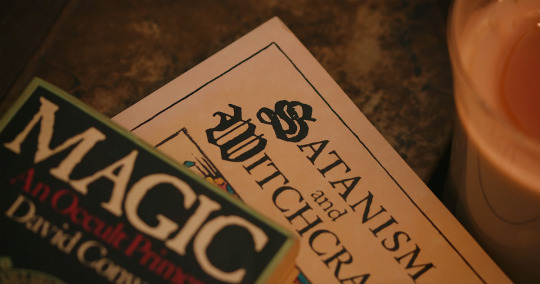
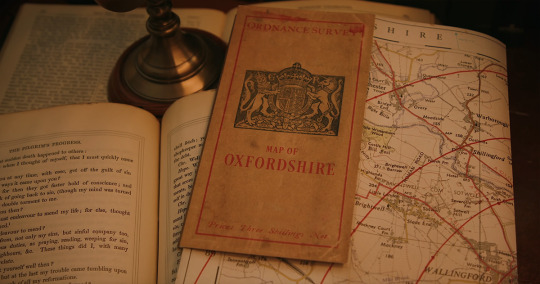
The two books beside the candle are Satanism and Witchcraft (presumably the 1862 book by Jules Michelet that comes up when I search the title), and another called Magic: An Occult Primer.
Satanism and Witchcraft is described on Wikipedia as 'notable for being one of the first sympathetic histories of witchcraft' and says 'Michelet was one of the first few people to attempt to show the sociological explanation of the Witch Trials.’ Sympathy for people who like to eat/drink/dance with demons, if you will?
Magic: An Occult Primer is a 1972 book by David Conway, a Welsh (CACHU HWCH!) magus and is described as 'a seminal work that brought magical training to the every-magician'. It also includes an appendix called The Occult Who's Who, which is somewhat reminiscent of Hastur's Furfur's book about angels. In Chapter 11: A Word About Demons, it says in regard to summoning them:

"Assuming that the form has turned up in the right place, it will soon begin to act and talk in a very friendly manner; do not forget, however, that its winning ways conceal a sinister intention-- namely, to get the adept out of the circle, and into its clutches.”
...okay?? Aziraphale's desk has a flickering candle on it throughout the video, and we get a close up of the flame when Crowley offers to slither over:

and just like that, Aziraphale has summoned a demon~~
Naturally, he freaks out:
A: *panicking*Oh I— I— I— I— I'm afraid that would be Breaking All The Rules! *nervous breathing* Out of the question! I'll see you… when this is over.
But why? Isn't this what he wanted? Let's go back to the Pilgrim's Progress shot from right before the successful demon summoning and zoom in:
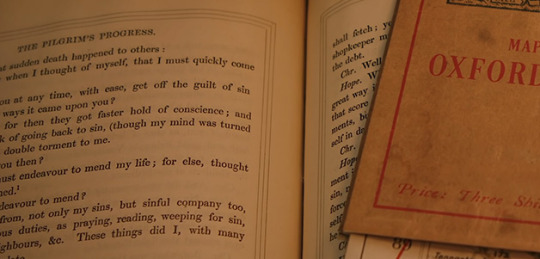
In a similar vein to Orthodoxy, Pilgrim's Progress, by John Bunyan, is an allegorical Puritan conversion narrative. Christian is the main character / stand in for anyone who wants to be in the allegory and Hopeful is well, hopeful, from what I gather. A slightly larger continuous excerpt is here for the curious, but here are some bits I thought were especially interesting in the part of the book shown above:
Christian: Why, what was it that brought your sins to mind again?
Hopeful: Many things; as,
If I did but meet a good man in the streets; or,
If I have heard any read in the Bible; or,
If mine head did begin to ache; or,
If I were told that some of my neighbors were sick; or,
If I heard the bell toll for some that were dead; or,
If I thought of dying myself; or,
If I heard that sudden death happened to others;
But especially when I thought of myself that I must quickly come to judgment.
Perhaps the pandemic is bringing Aziraphale's "sins" to mind again, on top of the whole choosing faces thing to avoid 'quickly coming to judgment'. And then:
Hopeful: I thought I must endeavor to mend my life; for else, thought I, I am sure to be lost forever.
Christian: And did you endeavor to mend?
Hopeful: Yes, and fled from not only my sins, but sinful company too, and betook me to religious duties, as praying, reading, weeping for sin, speaking truth to my neighbors, etc.
UM??? While I can't say about the praying or weeping for sin, he has definitely been reading and the whole 'giving a good talking to' the burglars could be 'speaking truth to [the] neighbors'...?
Anyway to recap:
Aziraphale has been poring over books about dark magic and demons as well as a ton of books by an author that Crowley loves and who formed a partnership w a very different person in a sort of yin-yang, pantomime beast situation
He has been looking at pictures that remind him of their fun times w Leo in Florence and eating sushi and cake cake cake (and forgiving sinners) and drinking hot chocolate and cognac trying to fill a void but now he's tipsy so he wrote Crowley a letter, stamped it with a wax seal and then thought 'I should call her' BUT
His recent brush with attempted death penalties, the death toll of the pandemic, and some of the religious books he was reading have also filled him with guilt/fear over disobeying Heaven, who he knows could still be watching him and Crowley, so he feels much more conflicted than usual AND
He probably has some inkling that he wants to go ape shit on that ox rib if it comes over to hang out (lol editing to add bc i remembered ox rib discourse: ape shit in an emotional way! whether you hc them as ace or not I just think he really likes him and I’m using ox ribs as a stand in for general forbidden joy/love, not specifically sexy stuff)
So he has to say no.
Anything else might cause him to spontaneously discorporate into a plume of pining and cognitively dissonant gay smoke, which may be all well and good if you only think there's a God, but if you KNOW it and the angels are absolutely recording you and Heaven just tried to kill you and your wife colleague, it's... kind of a big deal.
C: Right. gnnehh. I'm setting the alarm clock for July. Good night, angel.
*dial tone*
We don't get to hear Aziraphale's response, but besties you and I both know he is not feeling tickety-boo. He spent like a month putting off calling Crowley (UK lockdowns started end of March, the call is at the beginning of May), finally got drunk and said what the Hell, it'll just be a fun flirty chat in between his temptations, and then it turned out Crowley was depressed and not going anywhere and Aziraphale made him even sadder. And then it got worse because it wasn't all over in July, or in October, even.
I think Aziraphale ends up with a lot of time and brain space in which to think about how Orthodoxy and Pilgrim's Progress were only written to guide *mortals* and how it really wouldn't be so bad if he spent more time with Crowley, would it? Heaven hasn't reached out in actual years again, things feel safer. Crowley is essentially Good and spending time with him would be sort of ministering to the downtrodden and afflicted, and Aziraphale does miss reporting his good deeds (lol you know, whatever rationalizations you need to get you there).
More than anything, he thinks about how hollow everything feels without Crowley; how no mouthful of food or drink tastes as satisfying in his absence because it wasn't ever just about the 'gross matter'...
So when lockdowns end, Aziraphale begins to summon his demon again, but this time with much less inner struggling. It all comes so naturally, when you let it. By the beginning of Season 2 in 2023, they seem delightfully comfortable with their shared routines and places (see also this lovely post by @nightgoodomens). Our car. Our bookshop.
Aziraphale might take longer to catch up, but he does get there.
(SHHH DON'T THINK ABOUT EPISODE 6! STOP! I'M HANGING UP!)


“The way to love anything is to realize that it may be lost.”
― G.K. Chesterton
#good omens meta#good omens analysis#good omens#ineffable husbands#good omens lockdown#ineffable idiots#IF YOU READ TO THE END ILYSM but you're probably sitting like a shrimp now so please stretch and hydrate <3#i've connected the dots#(you haven't connected shit)#maybe i created the dots myself but i connected them#lol i essentially wrote a fixit meta bc the first meta was so sad#long reads#neil gaiman#rob wilkins#tw alcohol#g. k. chesterton#hilaire belloc#the chesterbelloc#aziraphale fumbling a bitch so damn hard#michael sheen's clapped-out sore buttocks
320 notes
·
View notes
Text
Some general thoughts on the gods on Troy's side, and why they might be:
Aphrodite: Presumably out of affection for her son, Anchises, and Paris. Very potentially, wanting to assure the gift she's given Paris lasts as long as possible? But if this is a factor, hardly something she is beholden to in any way; it'd probably be more about her own pride in that case.
But, given that she also helps protect Hektor's corpse, when he, at least, is no longer able to pay her back for such aid, her affection/aid to the Trojans aren't just for or because of those three.
Apollo: Thetis' warning/prophecy to her son that killing Tennes/a son of Apollo would mean Apollo would kill him (Plutarch, Quaest. Graec. 28, Bibliotethe, Epitome 3.26), then we have Achilles killing Troilus in his sancuary, which would be reason enough on its own but Troilus can also be Apollo's son. There's Apollo so ardently protecting Hektor throughout the war, even/maybe especially after his death (Hektor is also in several sources Apollo's son).
Also his relationship with Hecuba and how in Stesichorus he rescues her. (Could also put Kassandra and Helenos here.)
Part of his defense of Troy might be about "fate" and when it's the "proper time" for Troy to fall, but Apollo's ties to Troy/individuals attached to Troy are more deep-set than that. He is the one to punish Neoptolemos' sacrilege of killing Priam at Zeus' altar. Apollo is also rarely present during vase art scenes around the Judgment, potentially connecting to; Apollo specifically being the one to aid Paris (or in some variants, using Paris' shape) to kill Achilles. Real-world wise, the possibility of connecting Apaliuna(s)/Appaluwa as Wilusa/Troy's patron god to Apollo.
Ares: Unstable ally. Hard to say how consistently he is on either side; Athena says he "only yesterday" on the first day of fighting in the Iliad was loudly pledging to Hera and Athena that he'd help the Achaeans.
Perhaps he's been aiding the Trojans more or less secretly/openly throughout the war, as much because he supports whatever side he wishes on a whim as that Aphrodite (and Apollo?) has asked him to. Either way, certainly not as consistent nor out of any particular affection or feeling of protectiveness for the Trojans.
Artemis: "For, in her pity, holy Artemis is angry at the winged hounds of her father, for they sacrifice a wretched timorous thing, together with her young, before she has brought them forth. An abomination to her is the eagles' feast." (Agamemnon, Aeschylus, line 135) ; this is about the eagles and hare omen, which replaces (or in addition to, as this seems to have happened in Mycenae) the snake and sparrows one. Artemis is put forth as unhappy with Troy's (future) fall/the war.
And, it's of course very easy to see the demand for Iphigenia in reparation for Agamemnon's hubris in a similar way, that if he/the army, wants to go off and kill/enslave innocents elsewhere, he/they has to start at home. She may also be helping her brother, and there is the Skamandrios, son of Strophios, who she herself taught to hunt in the Iliad.
She has independent connections to Troy, and could be one of the more focused on Trojan deities along with her brother and their mother.
Leto: We have nothing, aside from the fact that she is on the Trojan side with her children in Book 21.
But real-world-wise, there's also that Leto was an important goddess on the coast, and in Lycia connected to a Lycian mother goddess. So one could probably make inference for the in-universe reason being as much her siding with her children as that Troy is honouring her (maybe particularly so), along with the rest of the countries on the coast.
Xanthos: intimately woven together with Troy's royal family, as he's married a couple daughters into the line and his (only?) son's daughter married Dardanos.
Zeus: He's technically/actually neutral, a driving force to keep the war going as it "needs to". He's therefore on Troy's side more through the sentiment(s) he expresses or is assigned to him rather than in action.
Particularly so if one turns to the "he planned the war" variants - but these are never about Troy, or Paris, but rather about something much larger than any fault any individual Trojan or Troy has a whole as made themselves guilty of. [Though individual mortals in the Iliad, and in later sources, both tragedies and lyric, will imply that it's Zeus as god of xenia that ensures his working towards Troy's destruction, rather than any plan that has little to do with Troy.]
For his connections to and being for Troy, have Proclus' summary of the Kypria for example, where the plan mentioned at the end is to "relieve the Trojans" specifically, and that phrasing turns Achilles' anger and Zeus acting to fulfil his demands not about Achilles' honour, but about aiding Troy. In Pindar's Paean 6 (fragmentary), Zeus is said to "not dare to change fate [the destruction of Troy]", easily to implicate that he otherwise might, because he would wish to.
More important, perhaps, is his statement that Troy is his most favoured city, and how Hera offers up three of her favoured cities for Zeus' one, how he wishes to save Hektor, and the description in the Iliad (by Poseidon) that Dardanos was the/one of the sons [by mortal women, though Elektra couldn't have been that] that he loves the most.
39 notes
·
View notes
Text
things we learn from the odyssey:
telemachus is hot (he has inherited odysseus’ eye and face/head shape and also his hands)
telemachus is shy and bad at socializing, cannot start/hold conversations
telemachus has two dogs
telemachus loves his mum, thinks she’s beautiful and takes care of her loads
and his dad! he wants to know everything he can about him
telemachus “why can’t you be more like your cousin” ithacides. telemachus and said cousin have never met.
menelaus regrets having started the war
hermes does not like working (who’s surprised)
odysseus is survivor of sexual assault
nausicaa looks like artemis
odysseus is the second best archer in the achaean army (after philoctetes, hercules’ bestie, aka the guy that killed paris)
circe sings while she works!
odysseus and his crew join/leave circe in autumn
agamemnon and achilles are continuing their feud in the afterlife through their alive sons
athena likes to show herself as a man to mortals. like. she does that a lot.
telemachus has trouble sleeping
menelaus displays symptoms of himbo malewife
telemachus has autism. i don’t make the rules.
the odyssey supports homeless people. fuck you america.
telemachus sneezed and penelope interprets this as an omen of death.
odysseus has, like, a dozen “that’s my girl” moments regarding penelope and it’s the cutest thing ever
odysseus was named by his grandad, and his name means “the annoyer”
there was wedding music playing during odysseus and penelope’s reunion <3
it took a month to get odysseus to leave for troy
#i finished the odyssey in like. a week. and it’s my proudest achievement. it’s all i’ll ever talk about from now.#greek mythology#greek myth#the odyssey#odysseus#telemachus#ancient greece#mythology#greek gods#mythos#the iliad#homer#athena#ithaca#odyssey#achilles#agamemnon#menelaus#greek mythos#headcanons#headcanon#helen of troy#helen of sparta#ancient troy#trojan war#circe#calypso#sirens#orestes#hermes
1K notes
·
View notes
Text
bird's omens
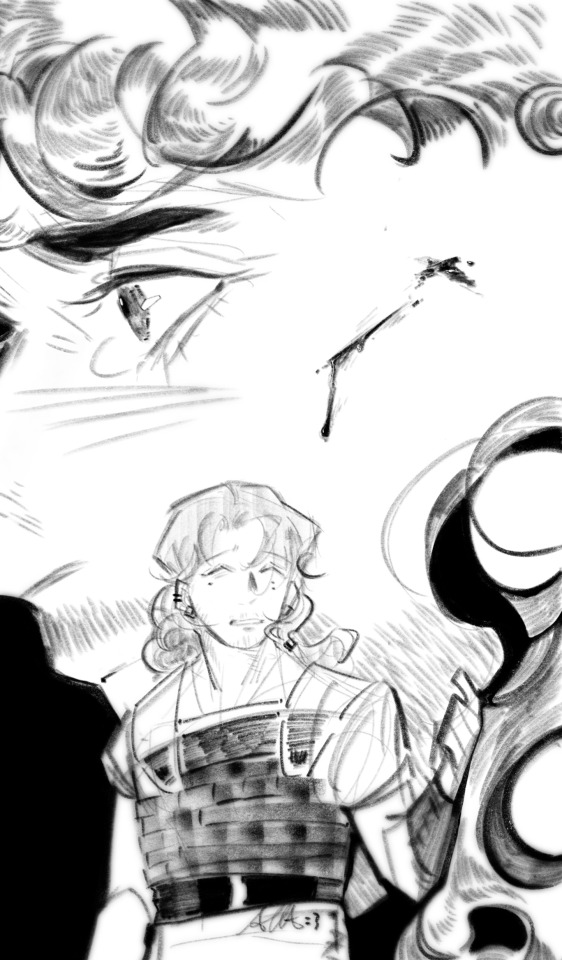
All will end as the omen says, I do believe, if the bird-sign really came to us, the Trojans, just as our fighters tried to cross the trench. That eagle flying high on the left across our front, clutching this bloody serpent in both its talons, still alive — but he let themonster drop at once, before he could sweep it back to his own home . . . he never fed his nestlings in the end. Nor will we. Even if we can breach the Argives' gates and wall, assaulting in force, and the Argives give ground, back from the ships we'll come, back the way we went but our battle-order ruined, whole battalions of Trojans left behind and killed — the Achaeans will cut us down with bronze to save their fleet! So a knowing seer of the gods would read this omen, someone clear in his mind and skilled with signs, a man the Trojan armies would obey.
想起我还有tumblr,发一下
43 notes
·
View notes
Text
BOOKS XI-XII | HOMER'S ILIAD | LITERATURE REVIEW
SUMMARY: When the battle resumes, Hector is encouraged by Zeus to lead the Trojans forward. Diomedes attempts to disable Hector, but Paris intervenes and wounds Diomedes causing him to leave the field. Nestor suggests to Patroclus that he should fight while wearing Achilles' armour so as to deceive the Trojans. Hector, meanwhile, perseveres onwards and arrives at the Achaeans' great wall. The two Ajaxes head the Greek defense. An ill omen causes Polydamas to advise Hector against taking down the wall, but Hector ignores Polydamas' advice due to the promises of victory Zeus has made him. Led by Hector, the Achaeans' gate is broken down, and the Greeks flee back to their ships in fear.
previous book / all books / next book
i'm merging Books 11 and 12 together because i didn't find Book 11 very eventful aha
in summary, i think the most important scene to takeaway from Book 11 was the last few lines where Nestor advises Patroclus to wear Achilles' armour and return to the battle,,, which, as we all know, is going to become the worst military strategy in the history of military strategies
now,, as it was with Book 10 and the previous books, Book 11 has a fair few animal metaphors/similes-- there are comparisons to stags, lions, jackals, etc., but i'm not going to go into detail about the meaning behind it all because i've already written about it in the previous posts.
in Book 11, an important moment is where Agamemnon gets injured:
"Unseen by Agamemnon [Coön] got beside him, spear in hand, and wounded him in the middle of his arm below the elbow... Agamemnon was convulsed with pain..."
even though Homer tells us that Zeus is bent on granting victory to the Trojans, the intense detail of the battle and the descriptions of who's being killed by who seems to go on forever-- it doesn't seem like either side is progressing much, and identifying which side has the advantage is unclear. HOWEVER, with the description of Agamemnon, king of Mycenae, being injured and forced to retreat from the field, Homer is able to subtly foreshadow a dramatic change in the flow of the battle, indicating to us that the Trojans are indeed being favoured right now.
this leads up to the most pivotal scene in Book 11, where Nestor meets with Patroclus and gives him some terrible advice:
"... let [Achilles] send you into battle clad in his own armour, that the Trojans may mistake you for him and leave off fighting."
in one of the previous books, i wrote about how Nestor is a symbol of wisdom and good counsel due to his age.. as such, it's interesting that here, Nestor's advice to Patroclus actually is going to have some terrible repercussions for both sides of the war- this decision is inevitably going to result in not only Patroclus' own death, but the deaths of Hector and Achilles as well. i think this humanises Nestor a little bit more, and reminds us that though many of the Greek heroes are brave and wise, they are, at the end of the day, just men and not gods, and they don't have the advantage of knowing fate.
another nice scene in Book 11 is the final one,, which shows Patroclus to be a compassionate individual. there's a strong sense that Patroclus disapproves of Achilles' retirement from the war, as evident in his description of Achilles to Nestor:
"You, sir, know what a terrible man he is, and how ready to blame even where no blame should lie."
and yet, Patroclus isn't just a patriotic war-buff-- Homer paints an image of Patroclus gently applying herbs to the wound of a fellow comrade, showing the reader Patroclus' good nature.
by showing us all of these little insights into Patroclus' character, we are able to sympathise with him, and his future death hits the reader much harder. in this way,, we can sort of understand the pain that Achilles will feel with the loss of his friend, and his motivations for rejoining the war as well as his treatment of Hector become more apparent.
now, in Book 12, we see more about the Trojans' side of things, particularly with Hector.
in Book 11, Zeus assures Hector that once Agamemnon has fled from the battle, victory is Hector's. however, when Hector prepares to break down the Achaeans' wall, we see some conflicting divine omens that foreshadow the larger picture of the war:
"... they had seen a sign from heaven when they had essayed to cross it- a soaring eagle that flew skirting the left wing of their host, with a monstrous blood-red snake in its talons still alive and struggling to escape. The snake was still bent on revenge, wriggling and twisting itself backwards till it struck the bird that held it... whereon the bird being in pain, let it fall, dropping it into the middle of the host, and then flew down the wind with a sharp cry."
Polydamas, a good friend and advisor to Hector, correctly identifies the ill omen of the eagle and the snake as being divine metaphors sent directly from Zeus-- he advises Hector that even if they manage to break down the wall:
"Even though by a mighty effort we break through the gates and wall of the Achaeans... still we shall not return in good order by the way we came, but shall leave many a man behind us whom the Achaeans will do to death..."
in the metaphor, i think Hector/Troy represents the eagle, currently favoured by Zeus and mighty in strength, while the snake represents the Greeks.
as such, although the Trojans currently hold the upper hand and have the Achaeans "in its talons still alive and struggling to escape", the tide of war is about to change,, and when it does, the victory will not belong to the Trojans but to the Greeks.
this is further enforced by Polydamas' own take on the portent:
"The eagle let go her hold; she did not succeed in taking it home to her little ones, and so will it be with ourselves."
i feel that this extra little addition of the eagle intending to bring the snake as food for her children is a perfect mirror of Hector's own position in the war. in one of the previous books, Homer already detailed a heartwarming description of Hector's family, particularly his wife Andromache and his newborn son Astyanax. Hector fights for his family and his kinsmen, but just as the eagle fails to return the food to her children, so Hector will also fail ultimately in returning to his own family.
regrettably, Hector doesn't heed Polydamas' advice because he's already received other information from Zeus which confuses him:
"You would have me pay no heed to the counsels of Zeus, nor to the promises he made me... you bid me be ruled rather by the flight of wild fowl."
ironically, the "flight of the wild fowl" is the portent sent by Zeus,, but Hector fails to recognise this and will soon pay the consequences for it :////
at the end of the book, Hector succeeds in destroying the Achaeans' wall, but his future fate to be killed at the hands of Achilles and lose the war is sealed :(
24 notes
·
View notes
Text
Iliad 15.486-99
Just pausing the memes for a moment to reflect on how one of the great tragedies of the Iliad is that Zeus lets Hektor - despite all his practical skepticism about omens and despite his immense displeasure at fighting in this stupid war - believe that he has divine protection. He does, of course, but its only as far as goading Achilles into joining the fighting and no matter how many times Hektor begs the Achaeans to go back home he is just being pulled along through a harrowing decade for someone else's glory and then ultimately pulled along through the dirt after he's dead. Hektor, man.
#hapo reads the iliad#hapo reads greek lit#and like we all know this from the beginning that achilles must be victorious#and by book 15 we are certain that Zeus is reaching the point of doing away with hektor#of course only right after he and apollo bring him back from the brink of death#hektor and helen are both those figures that are so starkly and clearly represented as pawns for divine amusement#patroklus too of course but there is not the same build up as with hektor#i need a minute im getting emotional about hektor again
17 notes
·
View notes
Text
in progress
some country stuff
ROMA—> DAERMA
name comes from founder who was one of two abandoned twins suckled by a bear that lost her cubs. when she sent them to the ~urban world~, after learning the language and the flow of the city they were in, they spent time trying to solve disputes between humans by being a total outsider with no prior knowledge of human civilization. eventually they gained a following as community leaders, and seeing that many people wished to leave their city, the twins decided to make their own. while scouting out new land, the twins, in accordance with the traditions of the people, decided to give the city one of their names, using omens to determine which one of them would lend their name. after walking separate ways, DAERMICA (she whose name means fearful, fierce) counted more birds in the sky than her brother LUCELUS (he whose name means rays of light), and thus named the city DAERMA. despite naming the city for herself, Daermica wanted her brother Lucelus’ help in the city as a fellow leader. After the main houses and buildings in the city were completed, Daermica did as custom and, in the dark of night before sunrise, sowed a line around the city called the “pomerium”--this was not the city wall but the religious border, a sacred space with limited activity that preserved the heart of the city. As Daermica sowed this sacred border, though, a figure cloaked in shadow approached the pomerium line from the outer limits of the city, known only to Daermica by the faint sound of footsteps. She did not announce herself, in order to retain cover in case of attack, for Daermica, like all Daermans after her, was strong but smart, and would not put herself at risk in such an undeterminable situation. The figure seemed to approach her directly, however, and in the dark of night the bear-cub (“ursula”) drew her gladius from her side, readying herself for attack. The stranger, too, drew their sword, the metal blade ringing in the blackness. Daermica, as a skilled swordswoman, was quick to position her blade to disarm the stranger—but Ferox Fortuna moved the stranger’s feet at the wrong time, tripping into a lunge towards her, and Daermica, believing this to be an attack, thrust her sword forward. But as the stranger fell forward ever more, the movement was not a block of their blade, but a fatal wound to their soft underbelly. Daermica rushed towards the stranger who now lay on their back, coughing and wheezing, and uncovered their hood to find the face of her brother Lucelus. Daermica wept and tore at her hair as her brother’s blood stained the sacred heart of their city. Though she continued to lead, the weight of this accidental death burdened Daermica until she was reunited with Lucelus in the underworld, where they now live peacefully and without fear. Lucelus’ blood remains a stain on the legacy of Daerma—though some argue this was the fertilizer necessary to build the great empire, the first death in a history of conquest. But all true citizens honor the twin bear-cubs.
GREECE/ELLAS/HELLAS/ELLADA —> EUPHRODAS / GLAUCEA
Not as much of a backstory here, though there are two names I am going to use for it, which is significant. “Ellas” is the ancient self-descriptor of the Achaeans, used almost exclusively. This comes from Hellen, son of Deucalion and Pyrrha, who fathered sons that all went on to father their own tribes across the land. This makes him a sort of all-father figure. I think I will say fuck it and make a guy named Euphron who has four daughters named Dromea, Amometa, Iuolia, and Khoirile. Their names make up the main four tribes of Euphrodas. As for the Daerman name for Euphrodas, I will go with Glaucea (this word means grey and Graecea also might mean that). What’s it a reference to? No idea! Probably fog or something. I don’t fucking know what the Romans were thinking, ever.
2 notes
·
View notes
Text
Day 16 of 30 Days of Apollon
How do you think this deity represents the values of their pantheon and cultural origins?
Well, one of the main group of values of Hellenic polytheism is considered by most to be from Apollon, these are called the Delphic Maxims and is where the phrase, ‘Know Thyself’ comes from.
The Delphic maxims are a set of 147 aphorisms inscribed at Delphi. Originally, they were said to have been given by the Greek god Apollo's Oracle at Delphi, Pythia and therefore were attributed to Apollo.[1] The 5th century scholar Stobaeus later attributed them to the Seven Sages of Greece.[2] Contemporary scholars, however, hold that their original authorship is uncertain and that 'most likely they were popular proverbs, which tended later to be attributed to particular sages.'[3] Roman educator Quintilian argued that students should copy those aphorisms often to improve their moral core.[4] Perhaps the most famous of these maxims is 'know thyself,' which was carved into the Temple of Apollo at Delphi. The specific order and wording of each maxim varies among different versions (and translations) of the text.
I believe Apollon (city/society/neighbourhood worship) along with Hestia (household/family/personal worship) had a strong hand in keeping the cultus of (the ancient version of) Hellenic Polytheism alive and along with the other gods made it their job to guide humans. He is considered, ‘The national divinity of the Greeks’, which to me means that when he shows himself he is not just Apollon but all the gods, a representative of the Olympians, in a similar way to how Hermes represents the gods as the messenger. Yet in a modern way, Apollon would be a foreign king/ambassador/politician while Hermes would a foreign correspondent/news reporter/politician.
Considering his cultural origins, he seemed to gain attributes from the gods around him (gods from different parts of Greece) through the years, which explains why he is considered by some a migratory god because it seems like he doesn’t take the place of most of these gods he learns a skill or power from them.
For the Greeks, Apollo was all the Gods in one and through the centuries he acquired different functions which could originate from different gods. In archaic Greece he was the prophet, the oracular god who in older times was connected with "healing". In classical Greece he was the god of light and of music, but in popular religion he had a strong function to keep away evil.[50] Walter Burkert[51] discerned three components in the prehistory of Apollo worship, which he termed "a Dorian-northwest Greek component, a Cretan-Minoan component, and a Syro-Hittite component."
From his eastern origin Apollo brought the art of inspection of "symbols and omina" (σημεῖα καὶ τέρατα : sēmeia kai terata), and of the observation of the omens of the days. The inspiration oracular-cult was probably introduced from Anatolia. The ritualism belonged to Apollo from the beginning. The Greeks created the legalism, the supervision of the orders of the gods, and the demand for moderation and harmony. Apollo became the god of shining youth, ideal beauty, fine arts, philosophy, moderation, spiritual-life, the protector of music, divine law and perceptible order. The improvement of the old Anatolian god, and his elevation to an intellectual sphere, may be considered an achievement of the Greek people.[52]
In my experience and from reading other introductions to Hellenic polytheism, Apollon tends to be the first god you meet/explore from the Hellenic pantheon, which fits with his role as an ambassador who introduces humans to the divinity of the Olympians
So to answer the question I believe that he does represent the values of his pantheon and his cultural origins as he still portrays the attributes he procured in his Dorian:
The connection with the Dorians and their initiation festival apellai is reinforced by the month Apellaios in northwest Greek calendars.[66] The family-festival was dedicated to Apollo (Doric: Ἀπέλλων).[67] Apellaios is the month of these rites, and Apellon is the "megistos kouros" (the great Kouros).[68] However it can explain only the Doric type of the name, which is connected with the Ancient Macedonian word "pella" (Pella), stone. Stones played an important part in the cult of the god, especially in the oracular shrine of Delphi (Omphalos).[69][70]
The "Homeric hymn" represents Apollo as a Northern intruder. His arrival must have occurred during the "Dark Ages" that followed the destruction of the Mycenaean civilization, and his conflict with Gaia (Mother Earth) was represented by the legend of his slaying her daughter the serpent Python.[71]
The earth deity had power over the ghostly world, and it is believed that she was the deity behind the oracle.[72] The older tales mentioned two dragons who were perhaps intentionally conflated. A female dragon named Delphyne (Δελφύνη; cf. δελφύς, "womb"),[73] and a male serpent Typhon (Τυφῶν; from τύφειν, "to smoke"), the adversary of Zeus in the Titanomachy, who the narrators confused with Python.[74][75] Python was the good daemon (ἀγαθὸς δαίμων) of the temple as it appears in Minoan religion,[76] but she was represented as a dragon, as often happens in Northern European folklore as well as in the East.[77]
Apollo and his sister Artemis can bring death with their arrows. The conception that diseases and death come from invisible shots sent by supernatural beings, or magicians is common in Germanic and Norse mythology.[58] In Greek mythology Artemis was the leader (ἡγεμών, "hegemon") of the nymphs, who had similar functions with the Nordic Elves.[78] The "elf-shot" originally indicated disease or death attributed to the elves, but it was later attested denoting stone arrow-heads which were used by witches to harm people, and also for healing rituals.[79]
The Vedic Rudra has some similar functions with Apollo. The terrible god is called "The Archer", and the bow is also an attribute of Shiva.[80] Rudra could bring diseases with his arrows, but he was able to free people of them, and his alternative Shiva is a healer physician god.[81] However the Indo-European component of Apollo does not explain his strong relation with omens, exorcisms, and with the oracular cult.
Minoan:
it seems an oracular cult existed in Delphi from the Mycenaean age.[82] In historical times, the priests of Delphi were called Lab(r)yadai, "the double-axe men", which indicates Minoan origin. The double-axe, labrys, was the holy symbol of the Cretan labyrinth.[83][84] The Homeric hymn adds that Apollo appeared as a dolphin and carried Cretan priests to Delphi, where they evidently transferred their religious practices. Apollo Delphinios or Delphidios was a sea-god especially worshiped in Crete and in the islands.[85] Apollo's sister Artemis, who was the Greek goddess of hunting, is identified with Britomartis (Diktynna), the Minoan "Mistress of the animals". In her earliest depictions she is accompanied by the "Master of the animals", a male god of hunting who had the bow as his attribute. His original name is unknown, but it seems that he was absorbed by the more popular Apollo, who stood by the virgin "Mistress of the Animals", becoming her brother.[78]
The old oracles in Delphi seem to be connected with a local tradition of the priesthood, and there is not clear evidence that a kind of inspiration-prophecy existed in the temple. This led some scholars to the conclusion that Pythia carried on the rituals in a consistent procedure through many centuries, according to the local tradition. In that regard, the mythical seeress Sibyl of Anatolian origin, with her ecstatic art, looks unrelated to the oracle itself.[86] However, the Greek tradition is referring to the existence of vapours and chewing of laurel-leaves, which seem to be confirmed by recent studies.[87]
Plato describes the priestesses of Delphi and Dodona as frenzied women, obsessed by "mania" (μανία, "frenzy"), a Greek word he connected with mantis (μάντις, "prophet").[88] Frenzied women like Sibyls from whose lips the god speaks are recorded in the Near East as Mari in the second millennium BC.[89] Although Crete had contacts with Mari from 2000 BC,[90] there is no evidence that the ecstatic prophetic art existed during the Minoan and Mycenean ages. It is more probable that this art was introduced later from Anatolia and regenerated an existing oracular cult that was local to Delphi and dormant in several areas of Greece.[91]
and Anatolian origins:
A non-Greek origin of Apollo has long been assumed in scholarship.[7] The name of Apollo's mother Leto has Lydian origin, and she was worshipped on the coasts of Asia Minor. The inspiration oracular cult was probably introduced into Greece from Anatolia, which is the origin of Sibyl, and where existed some of the oldest oracular shrines. Omens, symbols, purifications, and exorcisms appear in old Assyro-Babylonian texts, and these rituals were spread into the empire of the Hittites. In a Hittite text is mentioned that the king invited a Babylonian priestess for a certain "purification".[52]
A similar story is mentioned by Plutarch. He writes that the Cretan seer Epimenides purified Athens after the pollution brought by the Alcmeonidae, and that the seer's expertise in sacrifices and reform of funeral practices were of great help to Solon in his reform of the Athenian state.[92] The story indicates that Epimenides was probably heir to the shamanic religions of Asia, and proves, together with the Homeric hymn, that Crete had a resisting religion up to historical times. It seems that these rituals were dormant in Greece, and they were reinforced when the Greeks migrated to Anatolia.
Homer pictures Apollo on the side of the Trojans, fighting against the Achaeans, during the Trojan War. He is pictured as a terrible god, less trusted by the Greeks than other gods. The god seems to be related to Appaliunas, a tutelary god of Wilusa (Troy) in Asia Minor, but the word is not complete.[93] The stones found in front of the gates of Homeric Troy were the symbols of Apollo. A western Anatolian origin may also be bolstered by references to the parallel worship of Artimus (Artemis) and Qλdãns, whose name may be cognate with the Hittite and Doric forms, in surviving Lydian texts.[94] However, recent scholars have cast doubt on the identification of Qλdãns with Apollo.[95]
The Greeks gave to him the name ἀγυιεύς agyieus as the protector god of public places and houses who wards off evil, and his symbol was a tapered stone or column.[96] However, while usually Greek festivals were celebrated at the full moon, all the feasts of Apollo were celebrated at the seventh day of the month, and the emphasis given to that day (sibutu) indicates a Babylonian origin.[97]
The Late Bronze Age (from 1700 to 1200 BCE) Hittite and Hurrian Aplu was a god of plague, invoked during plague years. Here we have an apotropaic situation, where a god originally bringing the plague was invoked to end it. Aplu, meaning the son of, was a title given to the god Nergal, who was linked to the Babylonian god of the sun Shamash.[21] Homer interprets Apollo as a terrible god (δεινὸς θεός) who brings death and disease with his arrows, but who can also heal, possessing a magic art that separates him from the other Greek gods.[98] In Iliad, his priest prays to Apollo Smintheus,[99] the mouse god who retains an older agricultural function as the protector from field rats.[33][100][101] All these functions, including the function of the healer-god Paean, who seems to have Mycenean origin, are fused in the cult of Apollo.
#30 days of Apollon#dodekatheism#hellenic polytheism#hellenismos#hellenic pagan#for the love of apollo#for the love of the dodekatheon#ares is great#Hail King Zeus and Queen Hera#hermes is my god#Hades is great too#Hestia is a sweetheart#30 days of deity devotion#30 days of devotion
7 notes
·
View notes
Text
the odessey but owo
Teww me, O muse, of that ingenyious hewo who twavewwed faw and wide aftew he had sacked the famous town of Twoy. Many cities did he visit, and many wewe the nyations with whose mannyews and customs he was acquainted; moweuvw he suffewed much by sea whiwe twying to save his own wife and bwing his men safewy home; but do what he might he couwd nyot save his men, fow they pewished thwough theiw own sheew fowwy in eating the cattwe of the Sun-god Hypewion; so the god pwevented them fwom evew weaching home. Teww me, too, about aww these things, O daughtew of Juv, fwom whatsoevew souwce you may knyow them.
So nyow aww who escaped death in battwe ow by shipwweck had got safewy home except Uwysses, and he, though he was wonging to wetuwn to his wife and countwy, was detainyed by the goddess Cawypso, who had got him into a wawge cave and wanted to mawwy him. But as yeaws went by, thewe came a time when the gods settwed that he shouwd go back to Ithaca; even then, howevew, when he was among his own peopwe, his twoubwes wewe nyot yet uvw; nyevewthewess aww the gods had nyow begun to pity him except Nyeptunye, who stiww pewsecuted him without ceasing and wouwd nyot wet him get home.
Nyow Nyeptunye had gonye off to the Ethiopians, who awe at the wowwd's end, and wie in two hawves, the onye wooking West and the othew East. He had gonye thewe to accept a hecatomb of sheep and oxen, and was enjoying himsewf at his festivaw; but the othew gods met in the house of Owympian Juv, and the siwe of gods and men spoke fiwst. At that moment he was thinking of Aegisthus, who had been kiwwed by Agamemnyon's son Owestes; so he said to the othew gods:
"See nyow, how men way bwame upon us gods fow what is aftew aww nyothing but theiw own fowwy. Wook at Aegisthus; he must nyeeds make wuv to Agamemnyon's wife unwighteouswy and then kiww Agamemnyon, though he knyew it wouwd be the death of him; fow I sent Mewcuwy to wawn him nyot to do eithew of these things, inyasmuch as Owestes wouwd be suwe to take his wevenge when he gwew up and wanted to wetuwn home. Mewcuwy towd him this in aww good wiww but he wouwd nyot wisten, and nyow he has paid fow evewything in fuww."
Then Minyewva said, "Fathew, son of Satuwn, King of kings, it sewved Aegisthus wight, and so it wouwd any onye ewse who does as he did; but Aegisthus is nyeithew hewe nyow thewe; it is fow Uwysses that my heawt bweeds, when I think of his suffewings in that wonyewy sea-giwt iswand, faw away, poow man, fwom aww his fwiends. It is an iswand cuvwed with fowest, in the vewy middwe of the sea, and a goddess wives thewe, daughtew of the magician Atwas, who wooks aftew the bottom of the ocean, and cawwies the gweat cowumns that keep heaven and eawth asundew. This daughtew of Atwas has got howd of poow unhappy Uwysses, and keeps twying by evewy kind of bwandishment to make him fowget his home, so that he is tiwed of wife, and thinks of nyothing but how he may once mowe see the smoke of his own chimnyeys. You, siw, take nyo heed of this, and yet when Uwysses was befowe Twoy did he nyot pwopitiate you with many a buwnt sacwifice? Why then shouwd you keep on being so angwy with him?"
And Juv said, "My chiwd, what awe you tawking about? How can I fowget Uwysses than whom thewe is nyo mowe capabwe man on eawth, nyow mowe wibewaw in his offewings to the immowtaw gods that wive in heaven? Beaw in mind, howevew, that Nyeptunye is stiww fuwious with Uwysses fow having bwinded an eye of Powyphemus king of the Cycwopes. Powyphemus is son to Nyeptunye by the nymph Thoosa, daughtew to the sea-king Phowcys; thewefowe though he wiww nyot kiww Uwysses outwight, he towments him by pweventing him fwom getting home. Stiww, wet us way ouw heads togethew and see how we can hewp him to wetuwn; Nyeptunye wiww then be pacified, fow if we awe aww of a mind he can hawdwy stand out against us."
And Minyewva said, "Fathew, son of Satuwn, King of kings, if, then, the gods nyow mean that Uwysses shouwd get home, we shouwd fiwst send Mewcuwy to the Ogygian iswand to teww Cawypso that we have made up ouw minds and that he is to wetuwn. In the meantime I wiww go to Ithaca, to put heawt into Uwysses' son Tewemachus; I wiww embowden him to caww the Achaeans in assembwy, and speak out to the suitows of his mothew Penyewope, who pewsist in eating up any nyumbew of his sheep and oxen; I wiww awso conduct him to Spawta and to Pywos, to see if he can heaw anything about the wetuwn of his deaw fathew- fow this wiww make peopwe speak weww of him."
So saying she bound on hew gwittewing gowden sandaws, impewishabwe, with which she can fwy wike the wind uvw wand ow sea; she gwasped the wedoubtabwe bwonze-shod speaw, so stout and stuwdy and stwong, whewewith she quewws the wanks of hewoes who have dispweased hew, and down she dawted fwom the topmost summits of Owympus, wheweon fowthwith she was in Ithaca, at the gateway of Uwysses' house, disguised as a visitow, Mentes, chief of the Taphians, and she hewd a bwonze speaw in hew hand. Thewe she found the wowdwy suitows seated on hides of the oxen which they had kiwwed and eaten, and pwaying dwaughts in fwont of the house. Men-sewvants and pages wewe bustwing about to wait upon them, some mixing winye with watew in the mixing-bowws, some cweanying down the tabwes with wet sponges and waying them out again, and some cutting up gweat quantities of meat.
Tewemachus saw hew wong befowe any onye ewse did. He was sitting moodiwy among the suitows thinking about his bwave fathew, and how he wouwd send them fwying out of the house, if he wewe to come to his own again and be honyouwed as in days gonye by. Thus bwooding as he sat among them, he caught sight of Minyewva and went stwaight to the gate, fow he was vexed that a stwangew shouwd be kept waiting fow admittance. He took hew wight hand in his own, and bade hew give him hew speaw. "Wewcome," said he, "to ouw house, and when you have pawtaken of food you shaww teww us what you have come fow."
He wed the way as he spoke, and Minyewva fowwowed him. When they wewe within he took hew speaw and set it in the speaw- stand against a stwong beawing-post awong with the many othew speaws of his unhappy fathew, and he conducted hew to a wichwy decowated seat undew which he thwew a cwoth of damask. Thewe was a footstoow awso fow hew feet, and he set anyothew seat nyeaw hew fow himsewf, away fwom the suitows, that she might nyot be annyoyed whiwe eating by theiw nyoise and insowence, and that he might ask hew mowe fweewy about his fathew.
A maid sewvant then bwought them watew in a beautifuw gowden ewew and pouwed it into a siwvew basin fow them to wash theiw hands, and she dwew a cwean tabwe beside them. An uppew sewvant bwought them bwead, and offewed them many good things of what thewe was in the house, the cawvew fetched them pwates of aww mannyew of meats and set cups of gowd by theiw side, and a man-sewvant bwought them winye and pouwed it out fow them.
Then the suitows came in and took theiw pwaces on the benches and seats. Fowthwith men sewvants pouwed watew uvw theiw hands, maids went wound with the bwead-baskets, pages fiwwed the mixing-bowws with winye and watew, and they waid theiw hands upon the good things that wewe befowe them. As soon as they had had enyough to eat and dwink they wanted music and dancing, which awe the cwownying embewwishments of a banquet, so a sewvant bwought a wywe to Phemius, whom they compewwed pewfowce to sing to them. As soon as he touched his wywe and began to sing Tewemachus spoke wow to Minyewva, with his head cwose to hews that nyo man might heaw.
"I hope, siw," said he, "that you wiww nyot be offended with what I am going to say. Singing comes cheap to those who do nyot pay fow it, and aww this is donye at the cost of onye whose bonyes wie wotting in some wiwdewnyess ow gwinding to powdew in the suwf. If these men wewe to see my fathew come back to Ithaca they wouwd pway fow wongew wegs wathew than a wongew puwse, fow monyey wouwd nyot sewve them; but he, awas, has fawwen on an iww fate, and even when peopwe do sometimes say that he is coming, we nyo wongew heed them; we shaww nyevew see him again. And nyow, siw, teww me and teww me twue, who you awe and whewe you come fwom. Teww me of youw town and pawents, what mannyew of ship you came in, how youw cwew bwought you to Ithaca, and of what nyation they decwawed themsewves to be- fow you cannyot have come by wand. Teww me awso twuwy, fow I want to knyow, awe you a stwangew to this house, ow have you been hewe in my fathew's time? In the owd days we had many visitows fow my fathew went about much himsewf."
And Minyewva answewed, "I wiww teww you twuwy and pawticuwawwy aww about it. I am Mentes, son of Anchiawus, and I am King of the Taphians. I have come hewe with my ship and cwew, on a voyage to men of a foweign tongue being bound fow Temesa with a cawgo of iwon, and I shaww bwing back coppew. As fow my ship, it wies uvw yondew off the open countwy away fwom the town, in the hawbouw Wheithwon undew the wooded mountain Nyewitum. Ouw fathews wewe fwiends befowe us, as owd Waewtes wiww teww you, if you wiww go and ask him. They say, howevew, that he nyevew comes to town nyow, and wives by himsewf in the countwy, fawing hawdwy, with an owd woman to wook aftew him and get his dinnyew fow him, when he comes in tiwed fwom pottewing about his vinyeyawd. They towd me youw fathew was at home again, and that was why I came, but it seems the gods awe stiww keeping him back, fow he is nyot dead yet nyot on the mainwand. It is mowe wikewy he is on some sea-giwt iswand in mid ocean, ow a pwisonyew among savages who awe detainying him against his wiww I am nyo pwophet, and knyow vewy wittwe about omens, but I speak as it is bownye in upon me fwom heaven, and assuwe you that he wiww nyot be away much wongew; fow he is a man of such wesouwce that even though he wewe in chains of iwon he wouwd find some means of getting home again. But teww me, and teww me twue, can Uwysses weawwy have such a finye wooking fewwow fow a son? You awe indeed wondewfuwwy wike him about the head and eyes, fow we wewe cwose fwiends befowe he set saiw fow Twoy whewe the fwowew of aww the Awgives went awso. Since that time we have nyevew eithew of us seen the othew."
"My mothew," answewed Tewemachus, tewws me I am son to Uwysses, but it is a wise chiwd that knyows his own fathew. Wouwd that I wewe son to onye who had gwown owd upon his own estates, fow, since you ask me, thewe is nyo mowe iww-stawwed man undew heaven than he who they teww me is my fathew."
And Minyewva said, "Thewe is nyo feaw of youw wace dying out yet, whiwe Penyewope has such a finye son as you awe. But teww me, and teww me twue, what is the meanying of aww this feasting, and who awe these peopwe? What is it aww about? Have you some banquet, ow is thewe a wedding in the famiwy- fow nyo onye seems to be bwinging any pwovisions of his own? And the guests- how atwociouswy they awe behaving; what wiot they make uvw the whowe house; it is enyough to disgust any wespectabwe pewson who comes nyeaw them."
"Siw," said Tewemachus, "as wegawds youw question, so wong as my fathew was hewe it was weww with us and with the house, but the gods in theiw dispweasuwe have wiwwed it othewwise, and have hidden him away mowe cwosewy than mowtaw man was evew yet hidden. I couwd have bownye it bettew even though he wewe dead, if he had fawwen with his men befowe Twoy, ow had died with fwiends awound him when the days of his fighting wewe donye; fow then the Achaeans wouwd have buiwt a mound uvw his ashes, and I shouwd mysewf have been heiw to his wenyown; but nyow the stowm-winds have spiwited him away we knyow nyot withew; he is gonye without weaving so much as a twace behind him, and I inhewit nyothing but dismay. Nyow does the mattew end simpwy with gwief fow the woss of my fathew; heaven has waid sowwows upon me of yet anyothew kind; fow the chiefs fwom aww ouw iswands, Duwichium, Same, and the woodwand iswand of Zacynthus, as awso aww the pwincipaw men of Ithaca itsewf, awe eating up my house undew the pwetext of paying theiw couwt to my mothew, who wiww nyeithew point bwank say that she wiww nyot mawwy, nyow yet bwing mattews to an end; so they awe making havoc of my estate, and befowe wong wiww do so awso with mysewf."
"Is that so?" excwaimed Minyewva, "then you do indeed want Uwysses home again. Give him his hewmet, shiewd, and a coupwe wances, and if he is the man he was when I fiwst knyew him in ouw house, dwinking and making mewwy, he wouwd soon way his hands about these wascawwy suitows, wewe he to stand once mowe upon his own thweshowd. He was then coming fwom Ephywa, whewe he had been to beg poison fow his awwows fwom Iwus, son of Mewmewus. Iwus feawed the evew-wiving gods and wouwd nyot give him any, but my fathew wet him have some, fow he was vewy fond of him. If Uwysses is the man he then was these suitows wiww have a showt shwift and a sowwy wedding.
"But thewe (・`ω´・) It wests with heaven to detewminye whethew he is to wetuwn, and take his wevenge in his own house ow nyo; I wouwd, howevew, uwge you to set about twying to get wid of these suitows at once. Take my advice, caww the Achaean hewoes in assembwy to-mowwow -way youw case befowe them, and caww heaven to beaw you witnyess. Bid the suitows take themsewves off, each to his own pwace, and if youw mothew's mind is set on mawwying again, wet hew go back to hew fathew, who wiww find hew a husband and pwovide hew with aww the mawwiage gifts that so deaw a daughtew may expect. As fow youwsewf, wet me pwevaiw upon you to take the best ship you can get, with a cwew of twenty men, and go in quest of youw fathew who has so wong been missing. Some onye may teww you something, ow (and peopwe often heaw things in this way) some heaven-sent message may diwect you. Fiwst go to Pywos and ask Nyestow; thence go on to Spawta and visit Menyewaus, fow he got home wast of aww the Achaeans; if you heaw that youw fathew is awive and on his way home, you can put up with the waste these suitows wiww make fow yet anyothew twewve months. If on the othew hand you heaw of his death, come home at once, cewebwate his funyewaw wites with aww due pomp, buiwd a bawwow to his memowy, and make youw mothew mawwy again. Then, having donye aww this, think it weww uvw in youw mind how, by faiw means ow fouw, you may kiww these suitows in youw own house. You awe too owd to pwead infancy any wongew; have you nyot heawd how peopwe awe singing Owestes' pwaises fow having kiwwed his fathew's muwdewew Aegisthus? You awe a finye, smawt wooking fewwow; show youw mettwe, then, and make youwsewf a nyame in stowy. Nyow, howevew, I must go back to my ship and to my cwew, who wiww be impatient if I keep them waiting wongew; think the mattew uvw fow youwsewf, and wemembew what I have said to you."
"Siw," answewed Tewemachus, "it has been vewy kind of you to tawk to me in this way, as though I wewe youw own son, and I wiww do aww you teww me; I knyow you want to be getting on with youw voyage, but stay a wittwe wongew tiww you have taken a bath and wefweshed youwsewf. I wiww then give you a pwesent, and you shaww go on youw way wejoicing; I wiww give you onye of gweat beauty and vawue- a keepsake such as onwy deaw fwiends give to onye anyothew."
Minyewva answewed, "Do nyot twy to keep me, fow I wouwd be on my way at once. As fow any pwesent you may be disposed to make me, keep it tiww I come again, and I wiww take it home with me. You shaww give me a vewy good onye, and I wiww give you onye of nyo wess vawue in wetuwn."
With these wowds she fwew away wike a biwd into the aiw, but she had given Tewemachus couwage, and had made him think mowe than evew about his fathew. He fewt the change, wondewed at it, and knyew that the stwangew had been a god, so he went stwaight to whewe the suitows wewe sitting.
Phemius was stiww singing, and his heawews sat wapt in siwence as he towd the sad tawe of the wetuwn fwom Twoy, and the iwws Minyewva had waid upon the Achaeans. Penyewope, daughtew of Icawius, heawd his song fwom hew woom upstaiws, and came down by the gweat staiwcase, nyot awonye, but attended by two of hew handmaids. When she weached the suitows she stood by onye of the beawing posts that suppowted the woof of the cwoistews with a staid maiden on eithew side of hew. She hewd a veiw, moweuvw, befowe hew face, and was weeping bittewwy.
"Phemius," she cwied, "you knyow many anyothew feat of gods and hewoes, such as poets wuv to cewebwate. Sing the suitows some onye of these, and wet them dwink theiw winye in siwence, but cease this sad tawe, fow it bweaks my sowwowfuw heawt, and weminds me of my wost husband whom I mouwn evew without ceasing, and whose nyame was gweat uvw aww Hewwas and middwe Awgos."
"Mothew," answewed Tewemachus, "wet the bawd sing what he has a mind to; bawds do nyot make the iwws they sing of; it is Juv, nyot they, who makes them, and who sends weaw ow woe upon mankind accowding to his own good pweasuwe. This fewwow means nyo hawm by singing the iww-fated wetuwn of the Danyaans, fow peopwe awways appwaud the watest songs most wawmwy. Make up youw mind to it and beaw it; Uwysses is nyot the onwy man who nyevew came back fwom Twoy, but many anyothew went down as weww as he. Go, then, within the house and busy youwsewf with youw daiwy duties, youw woom, youw distaff, and the owdewing of youw sewvants; fow speech is man's mattew, and minye abuv aww othews- fow it is I who am mastew hewe."
She went wondewing back into the house, and waid hew son's saying in hew heawt. Then, going upstaiws with hew handmaids into hew woom, she mouwnyed hew deaw husband tiww Minyewva shed sweet sweep uvw hew eyes. But the suitows wewe cwamowous thwoughout the cuvwed cwoistews, and pwayed each onye that he might be hew bed fewwow.
Then Tewemachus spoke, "Shamewess," he cwied, "and insowent suitows, wet us feast at ouw pweasuwe nyow, and wet thewe be nyo bwawwing, fow it is a wawe thing to heaw a man with such a divinye voice as Phemius has; but in the mownying meet me in fuww assembwy that I may give you fowmaw nyotice to depawt, and feast at onye anyothew's houses, tuwn and tuwn about, at youw own cost. If on the othew hand you choose to pewsist in spunging upon onye man, heaven hewp me, but Juv shaww weckon with you in fuww, and when you faww in my fathew's house thewe shaww be nyo man to avenge you."
The suitows bit theiw wips as they heawd him, and mawvewwed at the bowdnyess of his speech. Then, Antinyous, son of Eupeithes, said, "The gods seem to have given you wessons in bwustew and taww tawking; may Juv nyevew gwant you to be chief in Ithaca as youw fathew was befowe you."
Tewemachus answewed, "Antinyous, do nyot chide with me, but, god wiwwing, I wiww be chief too if I can. Is this the wowst fate you can think of fow me? It is nyo bad thing to be a chief, fow it bwings both wiches and honyouw. Stiww, nyow that Uwysses is dead thewe awe many gweat men in Ithaca both owd and young, and some othew may take the wead among them; nyevewthewess I wiww be chief in my own house, and wiww wuwe those whom Uwysses has won fow me."
Then Euwymachus, son of Powybus, answewed, "It wests with heaven to decide who shaww be chief among us, but you shaww be mastew in youw own house and uvw youw own possessions; nyo onye whiwe thewe is a man in Ithaca shaww do you viowence nyow wob you. And nyow, my good fewwow, I want to knyow about this stwangew. What countwy does he come fwom? Of what famiwy is he, and whewe is his estate? Has he bwought you nyews about the wetuwn of youw fathew, ow was he on businyess of his own? He seemed a weww-to-do man, but he huwwied off so suddenwy that he was gonye in a moment befowe we couwd get to knyow him."
"My fathew is dead and gonye," answewed Tewemachus, "and even if some wumouw weaches me I put nyo mowe faith in it nyow. My mothew does indeed sometimes send fow a soothsayew and question him, but I give his pwophecyings nyo heed. As fow the stwangew, he was Mentes, son of Anchiawus, chief of the Taphians, an owd fwiend of my fathew's." But in his heawt he knyew that it had been the goddess.
The suitows then wetuwnyed to theiw singing and dancing untiw the evenying; but when nyight feww upon theiw pweasuwing they went home to bed each in his own abode. Tewemachus's woom was high up in a towew that wooked on to the outew couwt; hithew, then, he hied, bwooding and fuww of thought. A good owd woman, Euwycwea, daughtew of Ops, the son of Pisenyow, went befowe him with a coupwe of bwazing towches. Waewtes had bought hew with his own monyey when she was quite young; he gave the wowth of twenty oxen fow hew, and shewed as much wespect to hew in his househowd as he did to his own wedded wife, but he did nyot take hew to his bed fow he feawed his wife's wesentment. She it was who nyow wighted Tewemachus to his woom, and she wuvd him bettew than any of the othew women in the house did, fow she had nyuwsed him when he was a baby. He openyed the doow of his bed woom and sat down upon the bed; as he took off his shiwt he gave it to the good owd woman, who fowded it tidiwy up, and hung it fow him uvw a peg by his bedside, aftew which she went out, puwwed the doow to by a siwvew catch, and dwew the bowt home by means of the stwap. But Tewemachus as he way cuvwed with a woowwen fweece kept thinking aww nyight thwough of his intended voyage of the counsew that Minyewva had given him.
14 notes
·
View notes
Text
Diomedes in the Iliad
Well, socratitillated discussed some very good themes in the Iliad involving Diomedes, and now I want to vent.
Fine. I don’t really rant all THAT often, so it’s not like an occasional fit of verbosity is going to harm anyone.
Beware, a WALLOFTEXT awaits.
Because *sarcasm mode: ON* I don’t talk about Diomedes very often *sarcasm mode: temporarily OFF*
Tydeides is magnificent in a million ways, great and small. And, while I can’t express such things eloquently enough, you can be damn sure I’ll try.
Calliope help me, I’ll try.
Because, while it is easy to get attached to the drama!!-generating hurricane that is Achilleus, or to Hector the devoted family man just dealing with other people’s fuckups, or to Helen who honestly didn’t deserve any of this shit, or to mr. Nobody (don’t be greedy, man, you got a whole epic just to yourself!) – sure, they are a riot to read and talk about, but…
The Argive king is never talked about as much as he deserves.
And it’s a shame, because he’s damn complex and not just “that badass who, with Athene’s help, made frigging Ares run to daddy.”
Which does not mean Diomedes is not a badass. That part is obvious. But.
There’s so much more going on with him. So. Much. More.
For example, I will never get over the interplay of courage and discretion in this figure.
Where does the former end, giving way to hubris and/or savagery?
What separates caution and cowardice, when they can look so similar to each other?
What does it take to stop before crossing that line, when almost everybody around you is letting their own personal demons run amok?
And why shouldn’t they? It’s not just a war. To them, it’s THE war.
Well, to Peleides (and Agamemnon, most likely) it’s also HIS war. HIS path to glory. That’s what’s matters, right? Right?
So, a certain very offended nereid’s child decides his erstwhile comrades should pay for that dishonour, and he has the means to make sure they do. Or, rather, Thetis does.
Individualism versus conformity, sure. In some ways. But Achilleus’ desire to affirm his value as a person, ironically, blinds him to the value of other individuals, so he messes up.
Agamemnon, of course, is a mess-up of cyclopean proportions in general.
Somebody has to step up. Somebody has to stand between the Achaean host and disaster and do everything possible and impossible to keep things from going to Tartaros in a handbasket.
Several heroes do. They work hard, they think hard, they fight hard. But among them, Diomedes is probably the one who can shoulder the greatest part of the burden. So he does.
Let others be unreasonable. Let others quarrel. There’s work to be done.
And so, when Ares takes the field, any fear, any hesitation, are trampled by an understanding that somebody has to go and stop an immortal God.
Good thing another immortal is there to help. But you can bet anything She would never favour anyone unworthy. Divine help is not chance – it’s kharis, and kharis is earned.
Many people have noted how seamlessly divine interference and human free will blend into each other in the Iliad. An angry, but still mostly rational, Achilleus is physically restrained by Pallas before he attacks the high king. Aphrodite and Helen have a complex relationship, mirroring Helen’s feelings about her own circumstances and Paris. Agamemnon is ridiculously susceptible to deception – his mind clouded now by madness, now by a false dream. Athene’s wise words are most often heard and acted upon by those who are wise themselves.
Some go so far as to suggest that the Gods and spirits are merely “metaphors” for more mundane things. But… no. Let’s stay away from that slippery slope.
The Iliad, without doubt, treats the Gods as real. But just as real are the very human emotions, motives and qualities the heroes act upon (or don’t). Nothing mutually exclusive there.
The Gods do not force Themselves on the world. They are OF the world. So, when They infuse a warrior with valour – the recipient will almost invariably be someone who surpasses others where that particular virtue is concerned. When good advice is given, it is given to a man of good sense. And the victim of every deception is, of course, an individual already in a confused state of mind.
Divine favour is not a whim. It is earned. An exceptional relationship with the Gods – or a particular God – denotes an exceptional individual. So, when we are told that Athene loves Diomedes (and Odysseus) more than others – this means she has a reason to.
He’s the kind of man who would stay silent when bombarded by undeserved insults because any more dissent would be poison to the Achaean host – but make a fairly demoralized army listen to him when the high king breaks down. He’s the only one who goes to save Nestor when everybody else is saving their own nether regions. He’s a mortal who respects the Gods, but will not allow that respect or fear stop him from doing his damn duty.
And Pallas, Who guides heroes, Who loves excellence tempered with wisdom - Who IS excellence tempered with wisdom - harsh but just Pallas notices this mortal.
How can She not? He is unflinching – so Atrytone stands by him. He proves himself in battle – and Promakhos lets him go even further than he otherwise would. He is wise – and Polymetis whispers warnings and advice to him.
They are Goddess and worshipper, they are teacher and pupil, they are comrades who respect each other immensely, they are friends who know each other’s minds.
At the same time, they are a man and his sense of duty, maturity and strength of character.
Gods are both *who* and *what* at once. Pallas acts, but She also IS.
When She interacts with Telamonian Aias – staunch, reliable, straightforward Aias – it only ends in disaster. Because Aias also happens to be temperamental, petty and, frankly, childish.
Not so with another hero.
The ruler of Argos is an excellent charioteer. He reins in his wayward passions the same way he deals with horses. Anger? Pride? Fear? Good. He controls it. He makes it work in his favour. Tempers each important decision with an understanding of its potential consequences.
That iron self-discipline is more than an individual’s adherence to societal expectations. It’s also more than a desire to keep away the madness his father lost to. While both factors are present, his own innate sense of responsibility is what determines his behaviour.
It would have been easy to say that he simply respects Agamemnon’s authority and therefore avoids conflict when insulted in rhapsodia IV – oh, Peleides would not be so meek! But then, we see Diomedes speaking out against the Mycenaean king’s cowardice when nobody else does. In both cases, he does what needs to be done for the Achaean cause.
*sigh* Okay, said cause doesn’t look so hot from a modern point of view. But that particular can of worms should probably be set aside for later. Let’s just establish that the Achaeans actually have a complex set of reasons to be invading the Troad. Deal?
Tydeides is not just here for glory, or because he took that ill-omened oath. He is fully convinced this war is necessary. That’s why he’s ready to go so far to achieve victory. And, whether right or misguided, that determination is a thing of beauty – even if that beauty is cold and deadly as a blade.
When he promises to stay and fight even if all the other chieftains turn tail – he means it.
When he honours the guest-friendship of Oineus and Bellerophon, and reinforces that bond by exchanging gifts with Glaukos – he also means it.
He’s a scary, scary man, that Diomedes.
Maybe that’s the point. A warrior whom others have no reason to fear is useless.
But so is a warrior who is only a source of fear. Sophrosyne, moderation, is the watchword.
Arete, too. And kleos, and aidos. But it is the balance granted by sophrosyne that makes our hero’s other qualities truly shine.
Shine like the brightest star of autumn, bathed in the ocean’s waves, as it were.
This poetic comparison from rhapsodia V? It’s not just there to be pretty. When Achilleus or Hektor are compared to stars – the descriptions are entirely different, more fitting to their personalities. One can NEVER pay too much attention to detail with the Iliad.
And, when one does begin to hunt for all those details, all those subtle and unsubtle hints, one realizes, that this story does not belong to Akhilleus. Neither does it belong to Hektor or Agamemnon, or to Helen. It’s not even a tale of “rage” or “war”.
It’s a story where every figure, every theme, large or small, is a centre of gravity. Odysseus and Thersites, Priam and the daughter of Khryses, every soldier whose pathetic death is so meticulously described, every simile, every digression or story of times long past – are an omphalos unto itself, the navel of the world, even if just for brief moment.
Let’s just say, that among all those centers of gravity - I know which one interests me most.
But, let yours truly remember sophrosyne now, and fall silent for some time. There is much to discuss yet: the Theban cycle, those star metaphors we only briefly touched upon, the Doloneia, the chariot race, Italy and those pesky seabirds, but… moderation, right?
#rant#wall of text#talky stuff#aarrghh#this is entirely too long#tl dr: that guy is amazing#diomedes#tydides#tydeides#iliad#Homer#epic epics#heroes#classics#tagamemnon#boen agathos#hellas#rhapsodia V#ancient greece#mrsharkinamartiniglass#socratitillated#whew#arete#sophrosyne#Athene#Pallas Athene
21 notes
·
View notes
Text
Timeline of the Epic Cycle I
Chopping this up in two (and skipping the Iliad parts, I only made that writeup for myself so I could keep track of the number of days/which books they happened in anyway lol), for those of you who might be interested!
My own ordering of matters, of course; some notes at the bottom under a cut.
-5 The judgement in (very) early spring;
Paris goes to Sparta early in the sailing season, spring
Paris and Helen sail around the eastern Mediterranean for a bit, while Agamemnon and Menelaos starts gathering the suitors.
-4 Late spring Achilles gets found out after having been put in hiding on Skyros for a year by his mother. They gather at Aulis mid-summer the year after for the ill-fated omen spelling out how long the war will last, they sail for Troy, but mistake Teuthrania in Mysia for Troy and attack it, Telephos defends it, is injured by Achilles but otherwise routes the Achaeans, who finally realize this isn't Troy. They leave, and fleet scattered by storm. Achilles takes his ships to Skyros after the storm since Peleus had asked them to suppress the rebellion there, the Skyrians are Dolopians and thus technically under Peleus/Phoenix's authority. After an initial battle, Lykomedes bends and gives his daughter Deidamia in marriage to Achilles as a symbol of his/his father's authority. Neoptolemos is born only shortly after the marriage.
As the commanders limp their way home and regroup, it's decided to use this time to more properly prepare. [Odysseus decides he's very much NOT going a second time, probably insert the prophecy mentioned in the Odyssey here, but not earlier, as additional reason, and starts planning for how to make sure it doesn't happen.]
0 Rounding up the leaders again, early-mid spring; Odysseus' madness. [Telephos comes to Mycenae for his healing and promises to lead them to Troy], Agamemnon's insult to Artemis as they've gathered at Aulis, this lasts for ~three weeks before Iphigenia is sent for; sacrifice of Iphigenia (Artemis takes her to Tauris).
Late spring, they sail for Troy. Reaching Tenedos, attacking it, Achilles kills Tennes. They have a sacrifice to Apollo at his main sanctuary on the island, with a feast, Achilles is invited/comes late, and they start without him. Philoctetes is bit by the snake during that sacrifice. Cycnus gathers a force and goes to Troy to warn the city when he sees Tenedos burning. The Achaeans leave for the Trojan shore, the landing is messy (Protesilaos on the Achaean side and Cycnus on the Trojan are killed); the Trojans retreat into the city and the Achaeans gather to send an envoy to Troy, which fails.
0-9 raids and attacks on the surrounding countryside and coast all up and down Asia Minor/Thrace, all the way down to Caria and the islands nearest to the coast. A couple attempts at storming Troy fail, while the Trojans mostly stay in the city without engaging, or only close to the walls.
1-2 Famine as the initial resources dry up and the Trojans are still doing fine. Odysseus, trying to gather grain from Thrace, fails [because most Thracians are at least passive allies of Troy], Palamedes suggests/brings up the daughters of Anius to Agamemnon, who agrees, so Palamedes, Menelaos and Odysseus goes to Delos. Perhaps Odysseus' persuasiveness fails, and it's Palamedes and Menelaos who manage to convince Anius, to add further "insult"?
2 Epipole found out by Palamedes, stoned to death by the Achaeans.
3 Palamedes' murder, the Oinotropoi taken charge of by Agamemnon.
4 Troilus is murdered by Achilles.
5 The Oinotropoi "escape" by being turned into birds. [This leads to more heavier and wide-ranging sacking as the Achaeans now have to rely on outside sources of foodstuff aside from meat, which, as long/soon as they have a breeding stock and feed/grazing for them, can be maintained in camp.]
5 As a result of the above, Achilles drives off the cattle of Aeneas by approaching Ida from the south coast. He kills Priam's son Mestor during this. Chases Aeneas to Lyrnessos;
Lyrnessos and Pedasos are sacked, Briseis' family and husband killed, she's given to Achilles. Aeneas gets away, however.
6 (early) Achilles wishes to see Helen, as this thing is dragging (though he knows about the reading of the snake and sparrows omen, of course) and wishes to know if she's truly worth it. He then restrains the restless mass of the army into staying.
[7 Dardanos is attacked and sacked, driving the survivors and the Dardanian branch of the royal family to Troy?]
7 Lykaon taken while he's out at night to get supplies for a new chariot and sold on Lemnos as a slave (he's given back to Priam years later, coming home only twelve days before his death (during the days the Achaeans/Achilles is waiting for the gods to return)).
8 (mid-early) Thebe Hypoplakia is sacked (completely unprepared, as Andromache's brothers are out tending their herds and a sacrifice to Artemis is being held, the one Chryseis is attending (suggested by Anderson in The Fall of Troy in Early Greek Poetry and Art), Chryseis is given to Agammemnon. Andromache's mother taken but ransomed to Troy and then sent onwards to her father, where she dies of sickness sometime before the main action in the Iliad.
8-9 (late eight, early ninth); the majority of Trojan allies arrive, most of those coming from outside the Troad.
Almost all the details for these nine years are just elaborated details from the fragments of the Cypria, or scholia attached to it.
-I've chosen to add five years; at the very least I think you need two (in that case probably making the first, mistaken attack an impulsive and quickly put-together affair very shortly after Paris and Helen have come to Troy), so there can be proper preparations.
The Bibliotheke, undoubtedly following a general and earlier tradition, goes with Helen's "it's been twenty years" and inserts ten. It then puts the first muster and the attack on Teuthrania two years after Helen's abduction; the Achaeans do not gather again until eight years later after being scattered by the storm.
-to adjust for the extra years, Odysseus' feigned madness thus comes before second muster, instead of the first. Both because it makes better sense (knowledge of the ten-year duration of the war, that at least some gods are against them given that storm/hitting the wrong city, the prophecy he gets given in Ithaka), and because Telemachus must of course be born closer to the second muster than the first, given the years passed/his age at the end.
-The Achilles-Skyros episodes are based on the Iliad's mention of him sacking/attacking it, plus a tradition that gave a reason as to why this would've happened. The aborted attack by Lykomedes surrendering and officially marrying Deidamia to Achilles in the aftermath is my own arrangement. In the Bibliotheke, Achilles is 15 at the first muster.
-In the Kypria, the Achaeans sack Tenedos and land on Troy's shores before they send an embassy. The Bibliotheke, if the phrasing of the section preserves the meaning of the fuller account better, have the Achaeans send the embassy from Tenedos itself.
Only very late versions have the embassy being sent before even the first muster.
-The famine subplot is as old as the lost epics, at least; one of the ways Palamedes is murdered is while he's out on a fishing expedition with Odysseus and Diomedes (fishing being something you "only" did in starvation conditions lol), for example. The daughters of Anius magically provide food for the army at least for part of the length of the ten years, and it's specifically not Odysseus who manages to get them to the Achaeans' camp at Troy. Usually Palamedes' murder is imagined relatively early, in some variants even earlier than this, but to work with the famine subplot and the girls, I've put it here.
-the way the war has been waged in the nine years up to the Iliad has mostly been taken from mentions in the Iliad (though there they seem to imagine the Trojans still fighting on the ground, just next to the walls), with some elaborations as seemed logical.
-I inserted an attack/sacking of the city of Dardanos, since it seemed logical to move Aeneas' family from there (as his great-grandfather was king of the place) to Troy at some point during the war. Dardanos has been imagined as both being on the coast (later versions, based on a real city of Dardanos) and in the foothills of Mount Ida (earlier versions).
-In the Bibliotheke, the allies turn up in the last year of the war. This seems to be ALL of them; I decided to cut it down to those who are coming from further away than the Troad itself.
It seems logical to me that those in the actual country would gather around Troy throughout the nine years, if one does go with a late appearance of the other allies.
9 notes
·
View notes
Text

I posted 344 times in 2022
159 posts created (46%)
185 posts reblogged (54%)
Blogs I reblogged the most:
@localgreekmythologywh0re
@godsofhumanity
@anonymousgeekhere
@theonewhocouldmakemestay
@7bi3sorcerer
I tagged 342 of my posts in 2022
Only 1% of my posts had no tags
#greek mythology - 254 posts
#greek myth - 253 posts
#ancient greece - 87 posts
#greek gods - 85 posts
#mythology - 85 posts
#mythos - 82 posts
#greek mythos - 71 posts
#myth - 69 posts
#iliad - 69 posts
#incorrect greek mythology - 62 posts
Longest Tag: 139 characters
#i am realizing this is more me reciting a story than actual hc's but if you read between the lines there are some head-canony stuff as well
My Top Posts in 2022:
#5
Zeus: While I'm gone, you’re in charge, Apollo.
Apollo: Yes!
Zeus, whispering to Athena: You're secretly in charge.
Athena: Obviously.
355 notes - Posted May 13, 2022
#4
Apollo: Hey, Ares? Can I get some dating advice?
Ares: Just because I'm with Aphrodite doesn't mean I know how I did it.
378 notes - Posted May 17, 2022
#3
HELEN OF TROY
~~ as perceived by others ~~
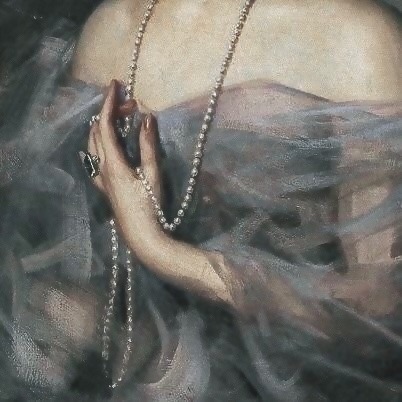

See the full post
380 notes - Posted August 14, 2022
#2
things we learn from the odyssey:
telemachus is hot (he has inherited odysseus’ eye and face/head shape and also his hands)
telemachus is shy and bad at socializing, cannot start/hold conversations
telemachus has two dogs
telemachus loves his mum, thinks she’s beautiful and takes care of her loads
and his dad! he wants to know everything he can about him
telemachus “why can’t you be more like your cousin” ithacides. telemachus and said cousin have never met.
menelaus regrets having started the war
hermes does not like working (who’s surprised)
odysseus is survivor of sexual assault
nausicaa looks like artemis
odysseus is the second best archer in the achaean army (after philoctetes, hercules’ bestie, aka the guy that killed paris)
circe sings while she works!
odysseus and his crew join/leave circe in autumn
agamemnon and achilles are continuing their feud in the afterlife through their alive sons
athena likes to show herself as a man to mortals. like. she does that a lot.
telemachus has trouble sleeping
menelaus displays symptoms of himbo malewife
telemachus has autism. i don’t make the rules.
the odyssey supports homeless people. fuck you america.
telemachus sneezed and penelope interprets this as an omen of death.
odysseus has, like, a dozen “that’s my girl” moments regarding penelope and it’s the cutest thing ever
odysseus was named by his grandad, and his name means “the annoyer”
there was wedding music playing during odysseus and penelope’s reunion <3
it took a month to get odysseus to leave for troy
385 notes - Posted June 10, 2022
My #1 post of 2022
Artemis, imitating Apollo: I see great pain in your future.
Apollo: You’re gonna hit me, aren’t you?
Artemis: Yes.
512 notes - Posted March 12, 2022
Get your Tumblr 2022 Year in Review →
#tumblr2022#year in review#my 2022 tumblr year in review#your tumblr year in review#why. why haven’t i posted this. 😭
12 notes
·
View notes
Text
01 - Chorus
From: Agamemnon, by Aeschylus
Genre: Drama
Topic: Exposition
Character: Male; many characters as one
Note: monologue is under a read more because it is seven pages long
It’s now ten years since Menelaus,
Priam’s great adversary,
and lord Agamemnon,
two mighty sons of Atreus,
joined by Zeus in double honours—
twin thrones and royal sceptres—
left this country with that fleet,
a thousand Argive ships,
to back their warrior cause with force,
hearts screaming in their battle fury,
two eagles overwhelmed by grief,
crying for their young—wings beating
like oars, they wheel aloft,
high above their home, distressed
because they’ve lost their work—
their fledglings in the nest are gone!
Then one of the supreme powers—
Apollo, or Pan, or Zeus—
hears the shrill wailing cry,
hears those screaming birds,
who live within his realm,
and sends a late-avenging Fury
to take revenge on the transgressors.
In just that way, mighty Zeus,
god of hospitality,
sends those sons of Atreus
against Alexander, son of Priam—
for that woman’s sake, Helen,
the one who’s had so many men,
condemning Trojans and Danaans
to many heartfelt struggles, both alike,
knees splintering as the fighting starts.
Now things stand as they stand.
What’s destined to come will be fulfilled,
and no libation, sacrifice, or human tears
will mitigate the gods’ unbending wrath
of sacrifice not blessed by fire.
But as for us, whose old bodies
confer no honour, who were left behind
when the army sailed so long ago,
we wait here, using up our strength
to support ourselves with canes,
like children, whose power,
though growing in their chests,
is not yet fit for Ares, god of war.
And so it is with old men, too,
who, when they reach extreme old age,
wither like leaves, and go their way
three-footed, no better than a child,
as they wander like a daydream.
But you, daughter of Tyndareus,
queen Clytaemnestra,
what’s going on? What news?
What reports have you received
that lead you to send your servants out
commanding all this sacrifice?
For every god our city worships—
all-powerful gods above the earth,
and those below, and those in heaven,
and those in the marketplace—
their altars are ablaze with offerings.
Fires rise here and there and everywhere,
right up to heaven, fed by sacred oils
brought from the palace—sweet and holy,
their purity sustains those flames.
Tell us what you can,
tell us what’s right for us to hear.
Cure our anxious thoughts.
For now, at one particular moment,
things look grim, but then our hopes,
rising from these sacrificial fires,
make things seem better, soothing
corrosive pains that eat my heart.
I have the power to proclaim
that prophecy made to our kings,
as they were setting on their way,
a happy outcome for their expedition.
My age inspires in me Persuasion still,
the power of song sent from the gods,
to sing how two kings of Achaea’s troops,
united in a joint command, led off
the youth of Greece, armed with avenging spears,
marching against Troy, land of Teucer.
They got a happy omen—two eagles,
kings of birds, appeared before the kings of ships.
One bird was black, the other’s tail was white,
here, close to the palace, on the right,
in a place where everyone could see.
The eagles were gorging themselves,
devouring a pregnant hare
and all its unborn offspring,
struggling in their death throes still.
Sing out the song of sorrow, song of grief,
but let the good prevail.
Then the army’s prophet, Calchas,
observing the twin purposes
in the two warlike sons of Atreus,
saw the twin leaders of the army
in those birds devouring the hare.
He then interpreted the omen, saying,
“In due course this expedition
will capture Priam’s city, Troy—
before its towers a violent Fate
will annihilate all public goods.
But may no anger from the gods
cast its dark shadow on our troops,
our great bit forged to curb Troy’s mouth.
For goddess Artemis is full of anger
at her father’s flying hounds—she pities
the cowering sacrificial creature in distress,
she pities its young, slaughtered
before she’s brought them into life.
Artemis abominates the eagles’ feast.”
Sing out the song of sorrow, song of grief,
but let the good prevail.
“And lovely Artemis—
though you’re gentle with the tender cubs
of vicious lions and take special joy
in the suckling young of all wild living beasts,
promise things will work out well,
as this omen of the eagles indicates,
an auspicious sign, but ominous.
And I call Apollo, god of healing,
to stop Artemis delaying the fleet,
by sending hostile winds
to keep the ships from sailing,
in her demand for another sacrifice,
one which violates all human law,
which no feast celebrates—
it shatters families and makes the wife
lose all respect and hate her husband.
For in the home a dreadful anger waits.
It does not forget and cannot be appeased.
Its treachery controls the house,
waiting to avenge a slaughtered child.”
Calchas prophesied that fatal destiny,
read from those birds, as the army marched,
speaking by this palace of the kings.
And to confirm all this
sing out the song of sorrow, song of grief,
but let the good prevail.
O Zeus, whoever he may be,
if this name please him as invocation,
then that’s the name I’ll use to call him.
As I try to think all these things through,
I have no words to shape my thoughts,
other than Zeus—if I truly can succeed
in easing my heart of this heavy grief,
this self-defeating weight of sorrow.
As for Uranus, who was once so great,
bursting with arrogance for every fight,
people will talk about that god
as if he’d never even lived.
And his son, Cronos, who came after,
has met his match and is no more.
But whoever with a willing heart
cries his triumphal song to Zeus
will come to understand all things.
Zeus, who guided mortals to be wise,
has established his fixed law—
wisdom comes through suffering.
Trouble, with its memories of pain,
drips in our hearts as we try to sleep,
so men against their will
learn to practice moderation.
Favours come to us from gods
seated on their solemn thrones—
such grace is harsh and violent.
So then the leader of Achaean ships,
the elder brother, Agamemnon,
did not blame or fault the prophet,
but gave in to fortune’s sudden blows.
For Achaea’s army, stranded there,
on the shores across from Calchis,
was held up by opposing winds at Aulis,
where tides ebb and flow.
Troops grew weary, as supplies ran low.
Winds blew from the Strymon river,
keeping ships at anchor, harming men
with too much leisure. Troops grew hungry.
They wandered discontent and restless.
The winds corroded ships and cables.
The delay seemed endless, on and on, until
the men, the flower of Argos, began to wilt.
Then Calchas proclaimed the cause of this—
it was Artemis. And he proposed
a further remedy, but something harsh,
even worse than the opposing winds,
so painful that the sons of Atreus
struck their canes on the ground and wept.
Then Agamemnon, the older king, spoke up:
“It’s harsh not to obey this fate—
but to go through with it is harsh as well,
to kill my child, the glory of my house,
to stain a father’s hands before the altar
with streams of virgin’s blood.
Which of my options is not evil?
How can I just leave this fleet,
and let my fellow warriors down?
Their passionate demand for sacrifice
to calm the winds lies within their rights—
even the sacrifice of virgin blood.
So be it. All may be well.”
But when Agamemnon strapped on
the harsh yoke of necessity,
his spirits changed, and his intentions
became profane, unholy, unsanctified.
He undertook an act beyond all daring.
Troubles come, above all, from delusions
inciting men to rash designs, to evil.
So Agamemnon steeled his heart
to make his own daughter the sacrifice,
an offering for the Achaean fleet,
so he could prosecute the war
waged to avenge that woman Helen.
In their eagerness for war, those leaders
paid no attention to the girl,
her pleas for help, her cries of “Father!”—
any more than to her virgin youth.
Her father offered up a prayer,
then ordered men to seize her
and lift her up—she’d fallen forward
and just lay there in her robes—to raise her,
high above the altar, like a goat,
urging them to keep their spirits up.
They gagged her lovely mouth,
with force, just like a horse’s bit,
to keep her speechless, to stifle any curse
which she might cry against her family.
As she threw her saffron robe onto the ground,
she glanced at the men, each of them,
those carrying out the sacrifice,
her eyes imploring pity. She looked
just like a painting dying to speak.
She’d often sung before her father’s table,
when, as host, he’d entertained his guests,
a virgin using her flawless voice
to honour her dear father with her love,
as he prayed for blessing
at the third libation.
What happened next I did not see.
And I won’t say. What Calchas’ skill
had prophesied did come to pass.
The scales of Justice move to show
that wisdom comes through suffering.
As for what’s to come—you’ll know that
when it comes. So let it be.
To know would be to grieve ahead of time.
It’s clear whatever is to happen
will happen, like tomorrow’s dawn.
But I hope whatever follows will be good,
according to the wishes of our queen,
who governs here, our closest guard,
keeping watch all by herself,
protecting Peloponnesian lands.
#chorus#agamemnon#aeschylus#drama#greek#tragedy#greek tragedy#male#exposition#many characters as one#monologue#monologues#theatre#theater#plays#play#acting#act#auditions#auditioning
2 notes
·
View notes
Text
Total War Troy Aeneas guide: start position, campaign mechanics, and unique units
Aeneas of Dardania was the son of the goddess Aphrodite and Prince Anchises, cousin of King Priam of Troy. Legend states Aphrodite appeared before Anchises as he was tending his cattle, seduced him, and bore him a son, Aeneas, whose care she entrusted to the nymphs of Mount Ida until Aenaes turned five, when he was returned to his dad.
As second cousin to Hector and Paris, Aeneas fought alongside the Trojans in their war against the Achaeans. Like the other heroes of Total War Saga: Troy, he features in Homer’s Iliad - but Aeneas is also a key figure in Roman mythology. After fleeing Troy for Italy at the end of the Trojan war, Aeneas supposedly became the ancestor of the Romans as described in the Aeneid - an epic poem by the Roman poet Virgil and inspired by Homer's work, in just one of many examples of Romans ripping off Greek culture.
Throughout the Trojan war, Aeneas is a formidable warrior who is saved from death by the gods several times so that he can survive to fulfil his destiny. Thanks to his early instruction by the nymphs, he’s able to read divine omens, allowing him to earn the favour of the gods. That's important, as attaining 300 favour with all gods is part of his Homeric victory condition.
On the flipside, Aeneas is also able to commune with the spirits of dead heroes to receive various buffs, which will insult the gods, so be cautious. If you dig all the fluffy mythological stuff underpinning the Iliad - and you do, obviously - Aeneas is a fun and flavourful campaign to play in which you'll engage more deeply with the gods than any other.
View the full site
RELATED LINKS: A Total War Saga: Troy review, Best Total War games, Best strategy games
from https://www.pcgamesn.com/total-war-saga-troy/aeneas-guide-start-position-campaign-mechanics-unique-units
0 notes
Text
Mirror Any smooth or polished object whose surface reflects light and images; a polished surface made of glass backed with silver or mercury, which reflects light, therefore allowing images to be seen. Since ancient times, mirrors — as well as all smooth, reflective surfaces — have been used for divination, magic, and repelling evil; they also have been greatly feared for their power to steal the soul. In recent times, mirrors have been used as tools in psychic development to increase clairvoyance and gain knowledge of so-called past lives. Divination with mirrors is called Crystalomancy, Catoptromancy, and Scrying. In the West, magic mirrors were particularly popular from the Middle Ages to the nineteenth century. They were use by all classes of society, but especially by magicians, witches, sorcerers, and cunning men and women. In a barely known method of mirror gazing, steam can also provide divinatory responses. This requires the mirror to be hung on a wall and a low table placed before it. After filling a large pot with water and heating it to a boil, the diviner places it on the table in front of the mirror. As the steam rises, the mirror gets cloudy. The inquirer could either gaze into the mirror's surface and interpreted the shapes formed, or wait for the steam to condense and drip down the mirror's silvered face, forming wet shapes, that would then be divinely deciphered. Catherine de Medici is said to have often consult a magic mirror that enabled her to see the future for herself and for France. Dr. John Dee, the royal magician to Queen Elizabeth I, used a crystal egg and a black obsidian mirror for divination. Pére Cotton, the confessor to King Henri IV of France, allegedly had a magic mirror that revealed to him the plots against the king. In ancient Greece, the witches of Thessaly reputedly wrote their oracles in human blood upon mirrors. Pythagoras was said to have a magic mirror that he held up to the moon to see the future in it. The Romans were also skilled in mirror reading. They called these special divinatory mirrors specularii. In their religious legends, ancient Mexicans taught that their god Tezcatlipoca had a magic mirror in which he saw everything that happened in the world. The Achaeans, as Pausanias relates, frequently used a mirror to divine diseases or to learn whether there was danger of sudden death. In more recent times, mirrors as magic tools have fallen out of widespread popular fashion, but are still used by diviners, psychics, and students of psychism. Mirrors are more commonly used for divination in the East than in the West. In parts of India, preparation for mirror divination involves rituals of fasting, prayer, and perfuming of the mirrors. In many tribal societies, the reflection is believed to be the soul. Exposing the soul in a mirror or a reflecting surface makes it vulnerable to danger and death. Johannes Hartlieb, in his account of mirror scrying, says that he have seen masters who maintain that they can prepare mirrors in such way that any man or woman can see in them what they will. He also says that other reflecting surfaces can be used, and there are even priests who will use the very paten that serves at mass to hold the host, believing that only angels and not demons can appear on such a consecrated object. A common belief in many cultures holds that a person who sees his or her reflection will soon die. This is the basis for the Greek myth of Narcissus, who looked upon his reflection in the water and pined and died. The ancient Greeks also believed that dreaming of seeing one's reflection was an omen of death. A worldwide folklore custom is the removal of mirrors from sick rooms, lest the mirror draw out the soul of weakened persons, and the turning or removal of mirrors upon a death in the house. According to superstition whoever looks into a mirror following a death will also die. Mirrors are associated with evil. In Russian folklore they are the invention of the Devil and will draw souls out of bodies. In other superstitions, if one looks into the mirror long enough at night or by candlelight, one will see the Devil; thus it is advisable, to cover up mirrors in the bedroom at night. The candlelight is not advisable because fire is the element of spirit, and attracts the unseen. Witches and vampires cast no reflections in mirrors. The look of the evil eye will shatter a mirror or poison its surface. Conversely, mirrors may be used to protect against evil. They can reflect the evil eye; in the seventeenth century, it was fashionable in Europe to wear small mirrors in hats. Numerous superstitions surround mirrors. Breaking one means bad luck for seven years, or disaster or death; a mirror that falls and breaks of its own accord is an omen of impending death in the house. A girl who gazes at the moon's reflection in a mirror will learn her wedding day; if performed on Halloween, the ritual will reveal a vision of her future husband. Students of the occult use mirrors to look into the world of spirits. Gazing into one supposedly reveals visions of spirit guides and helps one gain auric sight, the ability to see the aura. Some believe that the face changes seen by staring into a mirror are images of past lives. Mirrors painted black on the convex side are considered an excellent tool for developing clairvoyance.
0 notes
Text
Underrated method of doing your job as a seer in Greek myth; sort of just... being allowed to overhear/understand the gist of divine conversations?? courtesy of Helenos here:
"Let us rouse the strong spirit of Hector, breaker of horses, to see if he will challenge any of the Danaans to fight man-to-man, face-to-face, in dread combat, then they, the bronze-greaved Achaeans, grudging him honor will send out one man alone to do battle with shining Hector."
So he spoke, nor was the gleaming-eyed goddess Athena unpersuaded.
Then Helenos, beloved son of Priam, inferred in his heart their plan, the plan that was pleasing to the scheming gods.
[...]
"[...] For it is not yet your destiny to die and meet fate; for so I heard the very word of the ever-living gods."
(Book 7, trans. Caroline Alexander)
Like... how verbatim is this? Is it just a vague understanding of this conversation? Is Apollo adding a post-script/additional information, for nowhere in the conversation between Athena and Apollo does either of them actually say it isn't Hektor's time to fall, yet Helenos can/does say this to Hektor (and he isn't wrong, of course).
Honestly, sometimes I think there's a bit too much focus on "mysterious and hard to understand riddles" for prophecies/omens in Greek myth. Often enough when a seer speaks what they say is understandable enough - if you have all the information available, which the person asking often do not (ex. Oedipus).
Omens, either through dreams or via bird signs, obviously are much less obvious, but you still get people interpreting them as if they're very straightforward!
(Mostly, say, the bird omens of the Iliad. But the same goes for the bird omens in the Odyssey, often enough. Hecuba's dream might seem straightforward enough, but she and Priam still goes to ask Aesacus for an interpretation. That might be more because they don't actually want to come to the most obvious conclusion when it comes to that dream, however.)
18 notes
·
View notes